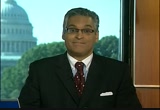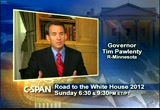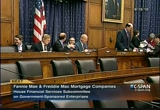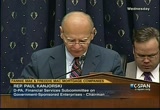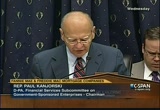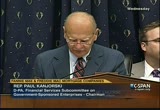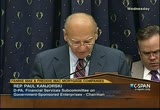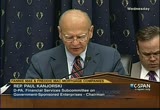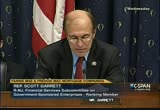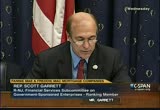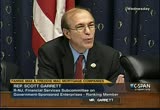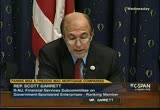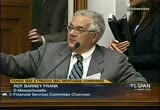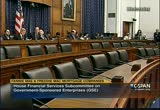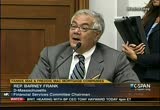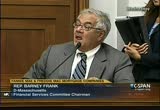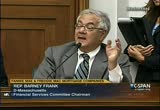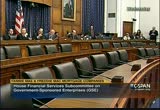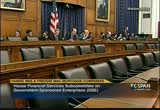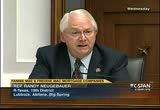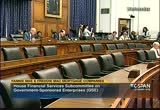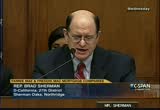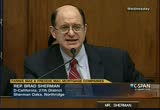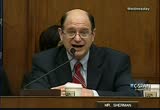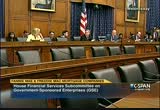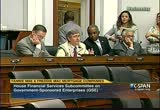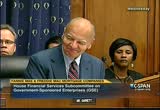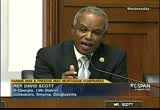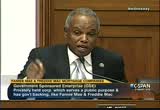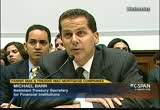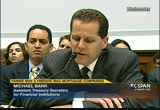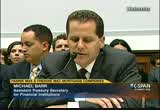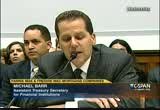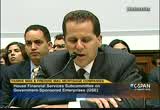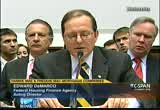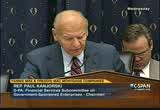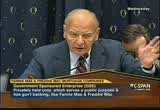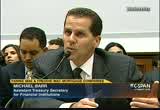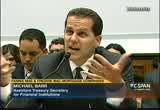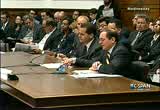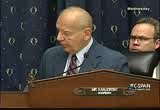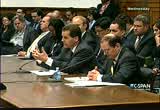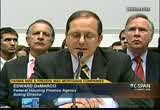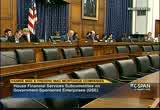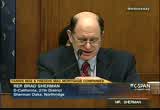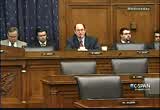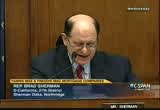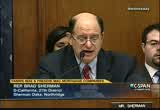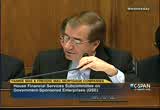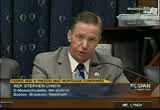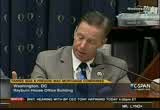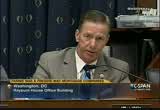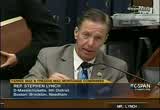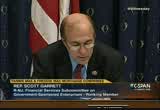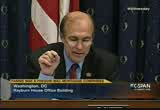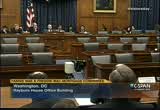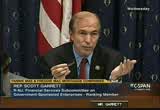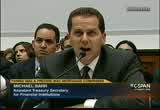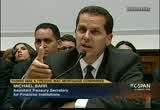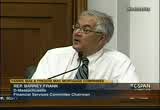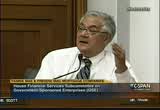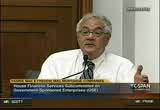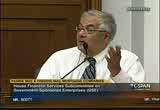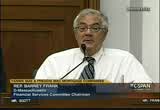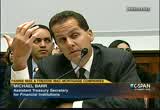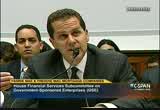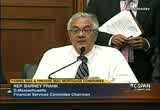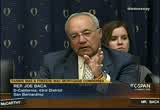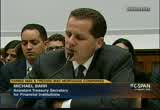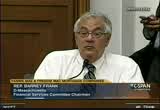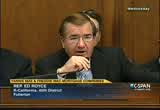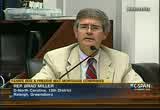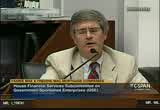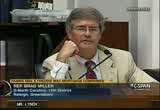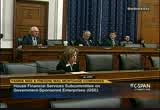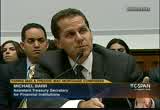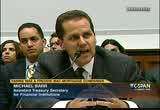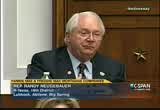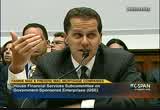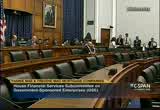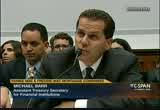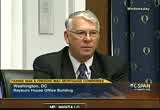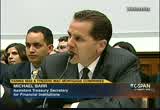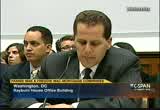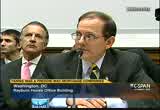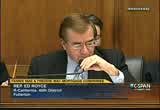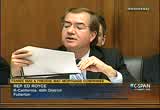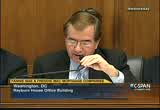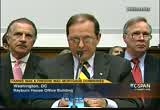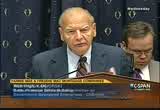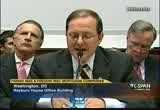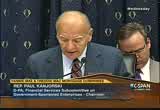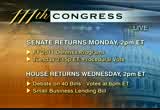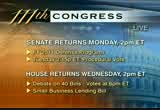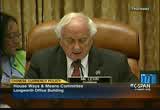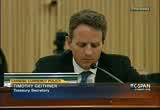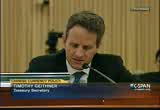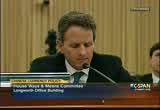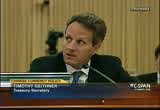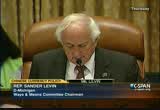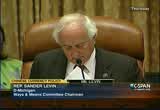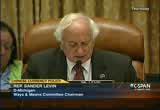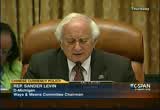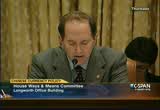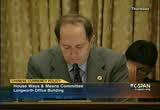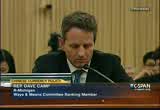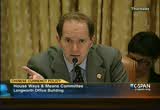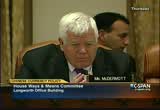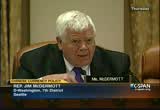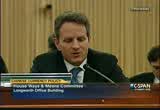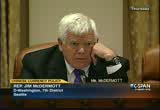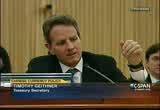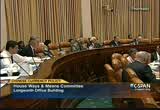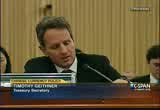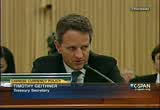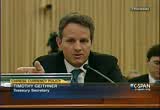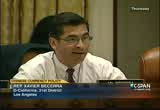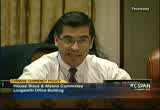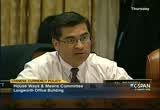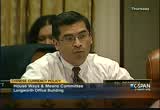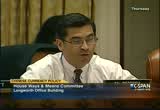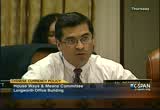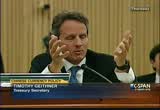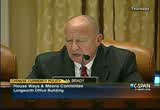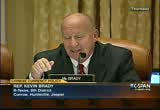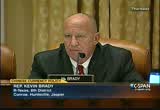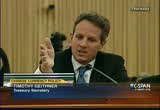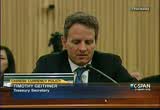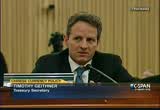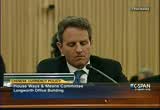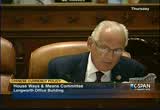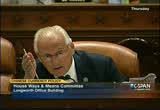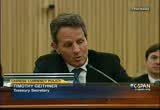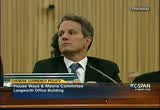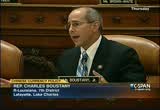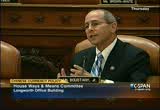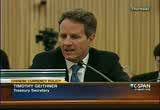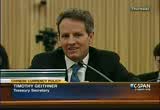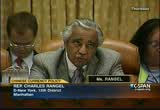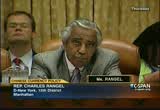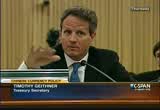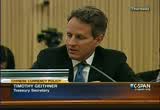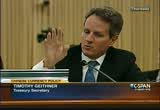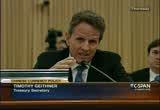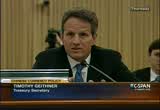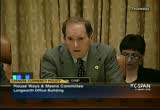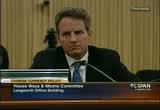tv C-SPAN Weekend CSPAN September 18, 2010 10:00am-2:00pm EDT
10:00 am
we hope we succeed in stopping that. host: endhomelessness.org. our guest has been nan roman. coming up tomorrow, the christian science monitor, a cover story looking at the economic mood of main street especially as we head into the november reelection. also joining us, reid wilson will look at candidates supported by the party and their success rate. our last segment, brian powell looking at the definition of a family and the acceptance of same-sex couples and unmarried couples as a definition of family. that will be tomorrow on "washington journal" plus your phone calls and a look at the papers. it starts at 7:00 a.m. we will see you then.
10:01 am
10:02 am
lew, president obama's choice to head the white house budget office. >> the conflict between the first amendment and national security "necessary secrets" author, this weekend on book tv. >> every weekend on c-span3, experience american history tv, 48 hours of people and events, telling the american story. hear historic speeches by national leaders and eyewitness accounts of events that shaped our nation. visit museums, historical sites and college campuses as professors delve into america's past. all weekend, every weekend on c-span3. >> for me or anyone else who is considering public service, the real question is, do you have a positive vision for the direction the country should head to give specific ideas to
10:03 am
implement that vision and a demonstrated set of experiences that show you can handle it and get it done. >> governor pawlenty on a potential presidential run, growing up in minnesota and eight years as governor. >> warren brown weeks the weekly column for "washington post." >> it is arguable to have an argument to say we would not have a black middle class had we not had general motors, ford and chrysler. >> in 2008, he supported the government bailout of the auto industry and sunday night, he'll talk about his life and what's ahead for car makers on c-span. >> next, a hearing on the mortgage holding companies, fannie mae and freddie mac. both have been under government control since the 2008 financial crisis. last month, financial services
10:04 am
committee chairman said freddie and fannie ought to be abottle issued. this subcommittee hearing is 2 1/2 hours. >> without objection, all members' opening statements will be part of the record. pursuant to committee rules and prior discussions, each side will have 15 minutes for opening statements. without objection, all members' opening statements will be made part of the record. i yield to myself five minutes. good morning. we meet today to focus on many strat fannie mae and freddie mac and the federal agencies to limit capital infusions into the two housing enterprises. this hearing is also the sixth in a series that we have so far convened this congress to examine the future of housing finance. two years have now past since the federal housing agency placed fannie mae and freddie mac under conserve toreship.
10:05 am
at the request of then treasure secretary henri paul sen, this law provided the treasury department with liquidity powers to support the enterprises. to stabilize the united states housing markets, the treasury department has purchased or announced plans to buy just under $150 billion in the senior preferred stock of the enterprises combined. moreover, according to a june report, the treasury department and the federal reserve have together purchased $1.236 trillion in the mortgage-backed securities. at this hearing, we will explore the many approaches used to protect taxpayers and limit the losses of fannie mae and freddie mac. for example, in july, the federal housing finance agency issued asked for documents in which the two enterprises
10:06 am
invested to determine if issuers of these securities are liable for enterprise losses. fannie mae and freddie mac have begun forcing underwriters purchased or guaranteed by the enterprises to buy back the loans if the loans violated the representations and warrants provided at the time of sale. as a result, the four largest commercial banks have incurred losses of $9.8 billion on the loans they have repurchased or expect to repurchase from fannie mae and freddie mac. during the height of the housing bubble, many players trusted what they bought. but they did not verify that the loans lived up to the promises contained in representations and warrants. during the height of the cold war, however, ronald reagan taught us better. for the housing finance system to regain its footing, we need the players in the market not only to trust but to verify. any new housing finance system must do both.
10:07 am
while the enterprises, the regulators and the treasury department have acted to limit the losses of fannie mae and freddie mac through several other methods, we must consider what more can and should be done to protect taxpayers both now and going forward. in particular, we must begin to think about approaches for recouping the taxpayers' money in the long run. we found a way to pay for the savings and loan crisis and we can surely find a way to recover the costs associated with this crisis. some of my colleagues may try to use today's hearing as an opportunity for political grandstanding. they, however, need to remember that people who live in glass houses should not cast stones. under the leadership of former chairman mike oxley, we tried for several years to enact bipartisan legislation to improve the regulation and activities of fannie mae --
10:08 am
fannie mae and familiar. many blocked these efforts. their delays allowed the housing crisis to fester. as we now consider the future of housing finance, we have a chance to proceed differently. the wall street reform and consumer protection act has laid the foundation for change by changing securitization rules, modifying appraisal practices and standardizing mortgage underwriting. the adoption of these process reforms should simplify the debates about altering the housing finance system. in sum, today's hearing brings us one step closer to figuring out what needs to be done to improve our housing finance system. as we previously said, my goals in these debates are to limit taxpayers' risk and establish a long-term funding source to help our middle-class families to buy
10:09 am
a home with an affordable mortgage. i look forward to hearing from our witnesses on these matters. i would like to recognize the ranking member, mr. garrett, for four minutes for his opening statement. mr. garrett. garth >> when you review the material that is before us in preparation of the hearing, you could hold a oversight hearing just about once a month and still have enough important issues to deal with. i'm sure the director would agree with that. the current state and future of mortgage finances continues to be a hot topic with the financial services committee and we are holding several hearings to look at the current state of the housing financial situation and how to structure the market in the future. unfortunately, i believe this focus is happening much later than it really should be.
10:10 am
really should have been happening about what, two years ago since fannie and freddie were put in conservorship and we are looking for a way to reshape that market. my republican colleagues and i continue to look for opportunities to end the bailout so they can wind down their businesses and accurately account for their losses to the american taxpayer. when we did these amendments and such, the majority party and the white house have prevented those efforts from moving forward. to my colleagues, including chairman frank who has said specifically, i quote, there is no urgency, we abottle issued fannie and freddie. just because you say something enough times doesn't mean it's true. just because they have been put into conserve toreship. they are continuing to hemorrhage billions of dollars each and every quarter.
10:11 am
really, there is no end in sight. so fannie and freddie have not been reformed and being used as a guinea pig for the home programs. quote, the money is not being lost by anything we are doing right now. well, in 2004 and 2005 when this committee was pushing ahead to institute new regulatory oversight over these companies, supporters of these entities, including chairman frank this wasn't necessary because they were interi haveic shape. you see where that has led us. this is just making the same excuse they made before and the same mistakes as well. as any expert in the mortgage business will tell you, mortgage loans typically hit their peak default rates when at five to seven years. the loans underwritten by fannie and freddie are only one or two years old. we have no idea what the market
10:12 am
will be like in three, four, five years from now. so we need to take concrete steps right now to reduce the ongoing financial risk that freddie and fannie pose to the american taxpayer. we need to increase the winddown of these entities' portfolio. their portfolio is $1.6 trillion with a current market demand for g.s.e.'s and there is no plausible reason they have to be this size. there is a significant amount of interest rate risk that continuously has to be hedged. as interest rates sometimes rise in the future, the hedging of these assets will be more complicated, volatile and harder to manage. with the current market situation and appetite for g.s.e.'s we should be requiring the entities right now to reduce their portfolio size and do it soon to reduce the risk before interest rates will rise and when they could make more money
10:13 am
back to the taxpayer. one closing note to the director, i thought it was a thoughtful decision you made to shut down the pace program. this was putting the taxpayer at risk. now we must need to make more hard decisions as you did then to protect the taxpayer and wind down the entities' portfolios and finally abolish these two companies. >> we will hear from the chairman of the full committee, the gentleman from massachusetts, mr. frank, for five minutes. >> i regret the fact that the ranking member has decided to continue a political debate, but if he was going to do it, i wish it had been done more fully. we have a problem here, because freddie and fannie bought loans that shouldn't have been made in the first place. the point is beginning in the period that the gentleman from new jersey alluded to, members of this committee led by the
10:14 am
gentleman from north carolina, tried to outlaw those loans. congress asked the federal reserve to do that and hadn't done it. in 2007, the first year we were in the majority, we did pass a bill in that year to prevent the kind of predatory loans from being made that fannie and freddie were buying. and here's what mr. garrett had to say on the committee vote on that bill to ban predatory loans. the increasing availability and affordability of subprime mortgage credit is and has been an important factor leading to the increase in home ownership in recent years. this bill, the bill to restrict predatory lending, may limit minority borrowers and deprive consumers from owning or maintaining a home. what we need to do is ensure it does absolutely nothing to home ownership particularly among minority communities who have benefited from the innovations
10:15 am
that have occurred in the marketplace. that is a song and praise to predatory lending. in fact, the gentleman was incorrect when he said in 2004 and 2005 when republicans were trying to restrain fannie mae and freddie mac, some of us were on the other side. exactly the opposite is the case nfment 2003, i didn't think they were in trouble. in 2004, when president bush ordered them to go beyond 50% in the number of loans that they bought from people below median income, the gentleman from new jersey was defending, i tried my opinion. in 2005, michael oxley, the republican chairman of the committee put a bill through this committee to restrain fannie mae and freddie mac. i voted for it. many of my republican colleagues voted against it. i found problems with an unrelated aspect of housing, the fact is that mr. oxley passed the bill through the house which
10:16 am
he thought would restrain fannie mae and familiar and the republicans in the senate and bush administration and some on this committee didn't like the bill. i never heard a more inaccurate characterization when you said the democrats were opposing. the republican majority of this house, the gentleman from texas supported, the gentleman from alabama supported it, put through the bill. we didn't stop them. the gentleman from new jersey didn't like the bill. the argument that the democrats stopped it is the opposite of the truth in 2004 and 2005. that broke down. secretary of treasure paulsen points out, he became secretary of the treasury in 2006. some in of the bush administration had givenup trying to reform freddie mac and fannie mae. he approached me and we worked together. and in the year of 2006, the majority switched and 2007 came,
10:17 am
this majority passed a tougher fannie and freddie regulatory bill in 2007 than the republicans passed in 2005. things moved beyond that. in 2008 when the senate caught up to us, which they sometimes do, the secretary put them in conservetorship. put them in there, has been very different. and yes, the pace loans have been a series of controversy. the governor of california, democratic attorney general of california are suing fannie and freddie because they are being too tough. "new york times" had a column criticizing freddie and fannie because they are requiring a higher credit score. freddie and fannie are very different. and that's why i say there is no urgency. it is because the pattern of abuse they had been engaged in
10:18 am
has changed. over the objection of the the gentleman from new jersey and others, we outlawed finally in 2010 in the financial reform bill the kind of predatory loans that were getting people in trouble which the gentleman from new jersey was fond off. and the "wall street journal," when we did pass the bill to restrict predatory loans called it a sarbanes-oxley bill. so let's get back to where we are. freddie and fannie are causing far less problem thanks to the action of the democratic majority in congress that gave the republican administration the power. there was bipartisanship there and let's continuity. >> and now we'll hear from the the gentleman from alabama, mr. balk cuss. -- balk cuss -- baucus.
10:19 am
>> i yield to the distinguished ranking member. mr. garrett: 10 seconds to respond to the chairman. it is odd that i'm put in the position to defending minority interests and that's what that quote was doing. i was defending the rights of minority and the minority housing interests and i would like to enter a record of june 28 signed by 70 republicans addressing that issue signed by 70 democrats written to president bush which would have weakened those same sort of regulations that the chairman was talking about. those regulations would have weakened the affordable housing standard that the chairman was talking about that they were trying to do at that period of time. >> without objection, so
10:20 am
ordered. and now the shortest 10 minutes in the world, mr. neugebauer. >> two years in the -- and the $148 billion we have freddie and fannie operating like they were before maybe with better underwriting and that's a good thing. the bottom line is that the taxpayers are still on the hook for these loans that are being originated today. one of the problems is that as along as we continue them operating guaranteeing these single-family mortgages which accounts for 75% of the losses that they sustained, we really are not going to see any private activity in the mortgage market at all. and so i think what many of us feel like, two years, it's time to begin do a model to wind this
10:21 am
activity down, to get the taxpayers off the hook and to move in the direction that we will be to encourage private activity in the mortgage market, but as long as freddie and fannie are the majority of the originators, there is no incentive for us to do that. and it's time for this committee and this congress to get the taxpayers off the hook and get a robust sustainable mortgage market that doesn't depend on the taxpayers to bail them out. >> thank you very much, mr. neugebauer. we'll hear for three minutes from mr. baucus. >> mr. chairman, i say to you and chairman frank, i think it's time for president obama to quit blaming president bush for all the problems that are confront
10:22 am
us -- confronting us today and it's time for you to quit saying that some republicans went along with you in watering down these affordable housing and underwriting standards. you know, the american people aren't concerned with the history of how this happened, they're concerned with taking action now to see it doesn't happen again. and for two years now, fannie and freddie have been controlled by the federal government. they own 79.9% of those corporations. the only reason they don't own 80% because if they own 80%, 1/10 of 1%, they would have to be put on the books of the federal government. they are 1/10 of a 1% from there. now we have released detailed proposals on what we want to do
10:23 am
with fannie and freddie and that's put them in receivership. no other corporation would be. they are failed corporations. we don't need to -- they're not too big to fail. there ought to be an orderly winddown and ought to be in receivership and would solve the uncertainty. the mortgage bankers have urged the administration to do that and the housing market needs it. we in the dodd-frank bill pushed for something very reasonable and that was for down payments for loans. that's not a very outrageous proposal. fannie and freddie quit approving mortgages without a down payment and without good credit history. not only did the majority party reject our attempts to simply say in dodd-frank that you have to have a down payment and have to have a good credit history.
10:24 am
they went beyond that and the administration and fannie and freddie have actually now started this affordable advantage program, mortgage program that actually doesn't require down payment and you don't have to have good credit history. we are laying the seeds for the next bubble, the next failure. assistant secretary, in all respect, you all have really done nothing but plan to do things. there's no proposals on the table. you've done nothing. you seem to be content, the administration, with doing nothing, except having progress hearings. well there hasn't been any progress. there have been planning sessions and -- there has been no action taken. and you've got 10% unemployment. you have 30% home price depreciation. you have these bailouts and what
10:25 am
bothers me worse than anything and i think the american people, we continue to make guarantees presently that the taxpayers will have to meet in the future and it's time that we quit the slow walking and start doing things. this should be a legislative hearing, not another planning session. and i would ask permission that my full statement be included in the record. >> the full statement will be included in the record. next gentleman from california, mr. sherman, is recognized for three minutes. >> three points, first, we need to stabilize home prices and make sure they're stable. if we see another drop in home prices, even in some key markets, that could create a double-dip recession. key to that is extending the
10:26 am
limit in the roughly one dozen most expensive housing markets in the country. if we allow this expire at the end of the year, it will be impossible to finance homes in most parts of los angeles and certain other major cities and even in areas where homes sell for less, if in the middle-class neighborhoods the price drops, then in the working-class neighborhoods, prices will drop as well and we will see a double-dip recession. i hope we get more than the 74 co-sponsors for h.r. 2483, which i introduced with representative gary miller from california. i commend mr. demarco for his agency's efforts against these wall street transfer fees. these provisions, indeed, say that every time the property is
10:27 am
transferred, somebody on wall street gets 1% of the gross purchase price. that undercuts the security of the lender. it disadvantages the home buyer. it complicates the transaction and it lowers comp.s for the entire numbers, thus impairing the value of the substantial investment that the federal government has in home prices nationwide. finally, to set the record straight, i think the chairman was eloquent in talking about h.r. 1461, which we passed in 2005. but the former chairman of this committee might have been even morel quent in his article which i would like to put into the record without objection. september 9 in the "financial times," he was quoted as describing that bill which we passed in may, 2005, which would
10:28 am
have prevented this bubble from occurring and what chairman oxley said, all the hand ringing and bed wetting is going on without remembering that the house stepped up. what did we get from the bush white house? we got a one-finger salute. mr. oxley did not specify which finger, but he did make it clear that it was the republican opposition in the senate and the white house that prevented us from nipping this crisis in the bud by stopping it in 2005. and had we done so, in the opinion of chairman oxley, and i believe chairman frank as well, we would be in much better shape. >> chairman oxley did make it clear it was a thumbs' up. it was clearly a finger. >> it was a finger, not a thumb. i yield back. >> the gentleman's time has expired. i recognize the gentleman from california, mr. royce, for two
10:29 am
minutes. we'll recognize the gentlelady from illinois, ms. bill earth, for two minutes. >> -- ms. biggert, for two minutes. >> when will this administration and congress wind down and put an end what we call these frankenstein mortgage giants fannie mae and familiar? in september, 2008, g.s.e.'s entered into a conservetorship. they received $150 billion taxpayer-backed funds. and liket is upwards of $6 trillion. the "wall street journal," they said they were twice as leveraged as bear stearns. the regulator which runs them, freddie and fannie has no inspector general reviewing
10:30 am
their activities and the many questionable actions of the g.s.e.'s. senate leadership should approve the nomination to be the f.h.a. inspector general. for the g.s.e.'s, we need transparency and accountability to end the bailouts and have's form. we have needed this for a long time. why with were there no substantive provisions included in the dodd-frank act. what's the plan? look forward to hearing from the witnesses and yield back. >> the gentlelady -- thank you to the gentlelady from illinois and hear from mr. miller for two minutes. >> i agree we need to think about a plan. we've got to re-invent our mortgage lending system and since there is something like
10:31 am
$14 trillion in outstanding mortgage debt right now, that's not a small matter, but it would be helpful in knowing who to fix what went wrong. and it is particularly hard to take, republicans complaining about democrats trying to place blame since all i have heard from republicans for two years is somehow this was the democrats' fault. we had a financial crisis that was seven years eight months in a republican administration. republicans were also in the majority in congress. and i know that the republican ministry of information has hit upon freddie and fannie as the culprits in this but when dick foltz sat in that seat, i asked him after having heard republicans worked freddie and fannie in the conversation, i asked him, how did they cause
10:32 am
lehman brothers to go bankrupt and he could not come up with any role that fannie and freddie played at all. they were losing market share. investment banks in new york and all republican critsisms were par on thing all the criticisms of their competitors who were not looking to have a more honest mortgage lending market. they were looking to make more money than they were already making and they were making more money than god. thank you. >> and we have two reservations, but i suspect neither mr. royce or mr. hensarling will appear, is that correct? >> how much time do we have remaining on our side? >> you have four minutes. >> i would like to claim that time. >> the gentleman from alabama wants to claim four minutes. he should be allowed to claim the four minutes and i so
10:33 am
recognize you. >> secretary barr and this is not a question, but i note you say, private gains will no longer be subsidized by public losses. and that's what's happened in the past. you acknowledge that. but if the government is going to make guarantees, if the government is going to buy mortgages and those mortgages fail, then there will be public losses. so i know your statement that you released last night says that. it also says capital and underwriting standards will be appropriate. and they certainly need to be. i think that's a given. we would 100% agree with that, but i am disturbed that we have for almost like affordable advantage along with the state financing authority, but there's no down payment required. and there is a good credit
10:34 am
history is not required. people are getting those without any down payments. and i was on cnbc this morning and wilbur ross, who was a guest said, you know, when you don't have no down payment because of your closing costs, you start 6% under water. you can't sell -- can't turn around and sell that house for the same amount. so if the housing crisis goes down and who knows whether they will or not, in my mind, you are creating more mortgages that taxpayers may one day will have to pick up. you say excessive risk taking will be restrained, i don't see that happening right now. when republicans and i think the administration resisted our attempt to say that if you have mortgages, you are going to have
10:35 am
to have a down payment. you need good credit history at least if the government is going to stand behind them. and finally, there has been a debate -- i noticed that some of the statements out of the administration are whether or not there ought to be an explicit government guarantee or an implied government guarantee, whether it needs to be implied or explicit. there is another option and that is the taxpayer shouldn't guarantee any of this. i think the forgotten man here and roosevelt used that term and that is the taxpayer. we are all forgetting about the taxpayer. as long as fannie mae and freddie mac exists as a government agency, you are going to have the risk of taxpayer subsidies and you are going to be subsidizing those who get those mortgages or those mortgage guarantees by people who rent, by people who don't have a mortgage or people who have a conventional mortgage
10:36 am
that's not backed by the government. and i think it's time for the government to get out of that business. as long as the government is in the business, they subsidize the business. that crowds out private investment and private capital. we basically eliminated the private mortgage market by having a government guarantee. the government can, because of that, knowing the taxpayer is standing behind it, the cost of capital for the government will be less. and we have seen that fannie and freddie have been operated on many occasions as an extension of some social or public policy to allow people to own homes at less than what the true cost would be. and finally, i would say, who bails out the government? if the government has to bail out fannie and freddie, who bails out the government? we just can't continue to be in
10:37 am
the rescue business or lifeguard business. i think the people are speaking out. in every election, they are saying get the government out of my pocketbook. >> the gentleman's time has expired. and now we have completed everything but one remaining minute on our side and recognize the gentleman from georgia for one minute. >> i take that minute, sir. joe friday said, just the facts, ma'am. just the facts. remember him, joe friday, "dragnet" series. it was paulsen, hank paulsen, secretary of the secretary, and he was not president obama's secretary of the treasury but ha3 wooulmortgageing r ves=of ing rent. yeeasury but president bush's secretary of the treasury who came before this committee and laid out the dire consequences if we did not
10:38 am
act. when you measure this deal, let's be honest. you have to figure out how you got into a problem before you can fig how to get out. not a matter of calling names, it's a fact. this did not happen under president obama. he was a state senator trying to become president. this happened under paulsen's watch, who was the treasury secretary for president bush. fact. close. now, there is still a need out here for help and assistance for middle and moderate-income people to be able to get their homes. let me add one thing, i hope when we pay attention, that we will to these community banks, our community banet t own 85% o the lenders who own stock in the g.s.e.'s. when you talk about doing all of that, it ain't just as simple as that. this is a complicated area and
10:39 am
the need is still there. >> the gentleman's time has expired. all time has expired. we'll now hear from the panel of witnesses that we have and we want to thank you for appearing before the subcommittee today. and without objection, your written statements will be made part of the record. you will each be recognized for five-minute summary of your testimony. i hope you will hold to that five minutes than members of the committee do. we have the honorable michael s. barr, united states department of treasury, assistant secretary barr. >> thank you, mr. chairman. members of the subcommittee, thank you for the opportunity to testify today about housing fifignce rd norm and the progre made since the placement of fannie mmar and freddie mac int conservetoachhip. before i talk about that, it's important to remember how we got here. the g.s.e.'s were allowed to
10:40 am
operate under a heads i win, taipen you lose system. they enjoyed the government support. they had ifigdequate oversight and capital. the market did not instill a g.ropriate discipline because the market sausmed they had a government bacet ttop. they were salk temic of a rangef failures throughout our fifigncial salk tem. as the private unregulated mortgage market grew and market ãg.laemeach began to loosen more market standards to pursue ever riskier business in the booming matopet, the g.d.s.e., which initially stuck to their core business saw their market shares fall precipitously. driven by profit motives, they ãg.urchased riskier mortgages without holding adequate capital or having appropriate risk management. these moves left them dangerously exposed fplgts as a result of the deterioration in
10:41 am
the housing market and their ifigbility to raise necessary nw capital, they went into conservetorship under the authority granted by congress. since september, 2008, fhsa has ensured that their assets are con served while continuing to play a critical role in making mortgage credit available. by facilitating the flow of credit, the g.s.ekss have served as a source of stariality for te housing market and helped milloldns of america cons to tae out a n le mortgage or refinanc. the new loans being guaranteed by the gy bae plkss are not contributing in any material way to the losses the gy bae plkss ateace. quite the contrary. in fact, it is the gy bae plkss book of loans, which are the overwhelming source of losses. the credit qf llity and risk
10:42 am
profile of the post book of business has improved compared to preconserve torshlt levels. now some have suggested taking time to get rd norm right will expose taxpaemeach to even grear losses. that is not the case. the losses at fannie mae and familiar faced are as a result of mistakes in the yeaach leadig up to the crisis, not those made today. the country is unforday.figtely sday.ck with the consequences o poor choices they made prior tiv the gy ba.e.'s are working hardo minimize losses and they are continuing to promote overall stability in the housing system, which is the most important source of loss mitigatoldn they can provide. while we continue to bring stariality to the mortgage market, we are hard at work on the business of rd nor t it is not tenable to leave in
10:43 am
place the system that we have todabe m the administratoldn is committe to delivering a comprehensive proposal to congress as called ateor under the dodd-frank act january, 2011. our proposal will call for ateundamental change. congress began the process of reform with the passage in 2bi8 and continued to the path. the next phase of reform came with the passage of the dodd-frank act which includes fundamental rd norm of mortgage market rules incof to pay requirements and risk retention standards for mortgages. homeowners are not
10:44 am
private gains will no longer be subsidized by public losses. capital and underwriting standards will be appropriate. consumer protection will be strengthened and excessive risk taking will be restrained. thank you. >> thank you, mr. barr. and we'll now hear from dr. edward demarco. >> thank you, mr. chairman. chairman kanjorski and members of the subcommittee. thank you for inviting me here
10:45 am
today. four topics, status, current condition of the enterprises, projected losses by the enterprises and consideration of the future of the housing system. i will summarize several key points. the enterprises have been operating for two years now since september, 2008. a principal focus is to maintain the secondary mortgage market role until legislation produces a resolution of their future. fhfa's i directed towards limiting losses and ensuring the enterprises price their services to address their price and risk. fhfa recognize that losses by the enterprises translate into costs for the taxpayers and we are doing everything to minimize future losses. examples of those loss mitigation activities include
10:46 am
loan modifications both through programs and each enterprise programs. repayment plans, short sales and deeds in lieu of foreclosure. the foreclosure alternatives pursued by the enterprises not only serve the goal of minimizing losses, but fulfill the statutory mandate to maximize assistance to homeowners while minimizing losses to the enterprises. fhfa reports every month to congress on the full range of enterprise foreclosure prevention activities through our federal property managers report. since the first full quarter, the enterprises have completed more than one million foreclosure alternative transactions with borrowers. as -- fhfa has been clear that the enterprises should enforce
10:47 am
lender compliance which includes pursuing purchases from those institutions whose loans did not meet the en-- enter price' guidelines. in july, they issued 64 subpoenas as part of an effort to determine whether other firms have legal responsibility for some of the enterprises' losses on private-backed securities which to date have been borne by the enterprises and taxpayers. in february, i communicated to congress my position that the enterprises will be limited to continuing their existing core business activities in taking actions necessary to advance the goals of conservetorship. we continue on that course today. when i appeared before you in late may, fhfa would expand their activities. in fulfillment of that pledge, we published the first of what
10:48 am
would be a quarterly report on the enterprise' financial condition. two of the findings in the reportr at the end of 2007, the enterprises had $71 billion of combined capital. from the end of 2007 through the second quarter of 2010, charges against capital totalled $226 billion. the largest contributor to these charges against capital has been the single family guarantee segment accounting for $166 billion or 73% of combined capital reductions over that period. during conservetorship, they have improved the quality of new mortgages purchased. new mortgage guarantees have been for borrowers with higher credit scores and loans with lower loan to value ratios. also when i appeared here in may, i was asked how much more money the enterprises may draw
10:49 am
under the preferred stock purchases agreement. i said across most of the models, combined treasury draws appear to be less than $400 billion. based on the analysis available to me, that remains my view today. to provide congress and the public with a more defined sense of the enterprise' potential future treasury draws, we are working with the enterprises to develop forward-looking projections for public release similar to the supervise other capital program conducted by the federal banking industries last year, the results of this exercise will not be forecast or expected outcomes but modeled projections in response to what if exercises that utilize various scenarios. as we prepare for the future, legislation is needed to strengthen our housing finance system and resolve conservetorship. the role of the government in
10:50 am
housing finance forward is a key decision point. i offer some issues for consideration regarding government guarantees. we look forward to working with the administration and congress in this endeavor. >> thank you, dr. demarco. and now we'll move on to questions by the committee members. let me take our first crack at it. not that i apologize, but i think in some of the opening statements, we have had a little bit of revisiononism of history, if we might and that tends to confuse the problem. let me try to move what i see the problem being. we are trying to get back to an active responsible real estate market in this county, mortgage market. in order to accomplish that at the level that the country needs, it seems to me we need a methodology of having a secondary market that brings in
10:51 am
and attracts more capital to the american market. not maybe to the exact level of pre-crisis state, but a great deal higher than today. have either of you given a great deal of thought whether or not just having two institutions like fannie and freddie that they obviously didn't compete very well and both seemed to rely on the same conditions and failed in the same way? what if we broke up the mortgage market into 10 g.s.e.'s and carried it further and say we offer the license to be purchased as we do air time in the communications field and let the private sector get in. but if we had 10 g.s.e.'s, if any one of them failed, we would be able to allow the bankruptcy process to weed that out and clean it out and continue on?
10:52 am
we wouldn't insulate against deflation. if across the board deflation occurs, i don't know how we can create any situation that's going to take that into consideration and protect against it. but what are your thoughts, instead of having the two g.s.e.'s, that we spread it over 10 or 15, if you will? and is there a given number that makes it so inefficient that it's not worth doing it in those small proportions? mr. barr. >> i think the question of how many entities are involved in a system of housing finance in the secondary market is only one set of factors in the development of a new housing finance system. and i think bringing it back to the fundamental level, what's the shape of that housing finance system, what do we want it to look like, how will it deliver, widely available credit
10:53 am
for sustainable mortgages, how will it deliver on financial stability goals, how will it deliver on affordability, there is broader and deeper sets of questions come into play in a sense first. the question of whether you want one entity or multiple entities, if you want multiple entities how many to have, relate to those broader sets of concerns. as you are thinking about the number of entities in the system involve a number of tradeoffs and you have identified some of those. question of what part of the system is inside the new housing system and what part is out, how do we ensure a level playing field for different kinds of appropriations. how do we prevent races to the bottom in that sector, if we have multiple entities involved, does it deal with the basic question of correlation of risk in the system or just add to
10:54 am
that. and i think those are the questions that need to be addressed in the reform plan. >> what do you anticipate the treasury's plan to be available so it could be started to be considered? i hear sometimes the beating of the chest up here on the hill at a point that it's going to take time, but we ought to get some time frame we are looking at so we inform the american people that this isn't going to go on, but we have constraints on time? >> as required under the dodd-frank act, we will be submitting a plan no later than january, 2011. it will give congress the opportunity to take up legislation in earnest in the next year and we would anticipate working very hard to get that done at that time. >> what are your thoughts on this, dr. demarco? >> mr. chairman, i would add two
10:55 am
things to what secretary barr said. first, with regard to the system we had, we were limited, too, because of the way the enterprises were structured, that model envisioned that there would only be two companies. they were given a number of advantages not otherwise available in the marketplace. and so we did not freedom of entry and exit. in terms of how many firms there might be in the future, if we are looking for a market model, the market should determine that, not a regulator or the government generally. so i would look for a market model in which there was licensing of firms to do certain things, but if they met certain requirements. other than, we should let the market determine that through entry and exit and that would spread and diversify risk. >> my time has expired. i recognize the gentleman from
10:56 am
alabama, mr. bachus, for five minutes. >> the subcommittee chairman said how do we keep the housing market going and that is what people are asking. i'm not sure that ought to be the question. the question should be, should the government keep the housing market going. is it up to the government through subsidies and guarantees to do that or is that the proper role of government. secretary barr, you said the government is committed to ensuring that the g.s.e.'s have sufficient capital to perform under any guarantees issued now or in the future. so you obviously envision fannie and freddie continuing to make guarantees, i suppose, is that correct? >> the basic goal of the provisions that the prior administration put into place and that we have continued under the preferred stock purchase
10:57 am
agreements is to assure that the g.s.e.'s can meet their obligations now and into the future until such time as the congress enacts reform. and when congress enacts reform, the future state of the system will decide after that point, do we have guarantees, do we not have guarantees, do we have g.s.e.'s, but in terms of obligations that are being issued today, absolutely standing behind those is essential to market stability, to the continued ability of our housing finance system to function and to not creating an environment of great instability that will harm taxpayers. >> let me ask this, and i'll ask mr. demarco, the idea of the government guaranteeing in the future, not the past, but the future guarantees. you have said that -- and this is in answer to some that have
10:58 am
called -- particularly on the other side, explicit guarantee for home mortgages as one option. you said replacing the enterprise' implicit guarantee does not help the shortcomings and it can produce its own problems. that was your statement i think today. i read it on your website yesterday. >> yes, sir. >> what are some of the shortcomings with a government guarantee? and what are some of the possible consequences for taxpayers? >> i think, congressman, what i tried to articulate there, while there are a number of industry representatives and others that have been advancing the cause of having explicit government guarantees backing a wide array of mortgages in the future housing finance system, my
10:59 am
testimony says that i think that some of the -- there are definitely some positives to that, but some of the negatives have not been fully explored. i have tried to identify several matters that lawmakers would want to consider in determining whether and the extent to which to provide explicit government guarantees in the future housing finance system. and that goes to the ability and capacity of the government to be able to adequately price the risk that's there. it goes to the question of to the extent that there's government support for an activity that provides a subsidy, you get more of that activity. and that comes as an opportunity cost. the funds aren't going elsewhere. it's a matter for the lawmakers to weigh. and if the government is involved in providing guarantees on a broad portion of the mortgage market, that it seems likely, and past experience would suggest, that the government would want to say to
11:00 am
some degree in how the mortgage market is working, pricing, what segments are being served. and you know, how that gets done and how that might affect the proper pricing of mortgage credit risk are challenges that need to be considered in a model that's relying upon government entities. >> all right. i'm reading part of what you said and i would agree with it. you said the premise for enexplicit guarantee is that the private markets are not able to price the risk of the mortgage default at reasonable levels, but we must ask and i agree with you whether the government could do a better job. and i think the whole debate here is whether the private market or the government can do a better job. and i think most of my colleagues on this side say the private market can. you go on to say, if a government backstop is underpriced, if the government underprices the risk, taxpayers may eventually foot the bill again.
11:01 am
11:02 am
>> the loans originated since the temporary limit went into effect have consistently outperformed the smaller conforming of loans -- at least that is what i have been told. they have dramatically lower delinquency rates. one issue that comes up is will we extend the 729 late in december. if congress waits until the end of the year to extend the current increased conforming loan limits, what do you think
11:03 am
will be the impact of not doing it earlier? will homes be able to open escrow in november and december without the borrower knowing whether he can get a conforming loan during the escrow time with congress perhaps not extending? how important is it for congress to act expeditiously? >> is roughly 90 days from purchase to closing on a mortgage. you would expect for home purchases that began in october that certainty for both the potential borrowers and lenders would be helpful in that regard.
11:04 am
>> if we do not act before we adjourn for the election fo october, people will not be able to open escrow in november because they will not know if they can close in january? >> to not be able to is a much higher hurdle. the market is coming back. the spreads on mortgages above 729 relative to those below has been coming down. there would be mortgage credit presumably available. >> i would hope you would go back and look at statistics. what i see in los angeles is that the jumbo market is working well for the homes in malibu. anyone buying a home in malibu has a banker on speed down,
11:05 am
probably the ceo. for the homes selling for $800,000, 99% of them are fha, fannie mae, or freddie mac. the idea that the private market could step in, i certainly do not see it. i look forward to working with you to see what the statistics are, not in the most expensive home markets the places where the 417 level applies to see under what circumstances people can get loans in the $600,000 range. let's move to the private resale fees. last month, your agency proposed guidance for fannie mae and
11:06 am
freddie mac and the federal home loan banks that they should not deal in mortgages on properties encumbered by the private transfer fees. i want to commend you for moving in that direction. we discussed the fis last time you appeared before this committee. -- we discussed these fees the last time you appeared before this committee. the frequently involve a circumstance where hidden in the documents is a statement that when the home buyer sells, 1% of the purchase price goes to a designee -- usually an investor on wall street. "the new york times" dated september 11, 2010, details the case with this fee is in a separate document that was not even included in the documents for signature in closing. do you expect that this proposed guidance will become guidance?
11:07 am
do you expect it to become adhered to by the relevant wonders? >> i expect that we will finalize the guidance in some fashion. it is currently in a public comment time. we're looking forward to receiving public comment on this. we have cast a wide net in the proposed guidance. i think it is important for us to take the time to get public comment on this and to consider it so that we make sure that wherever we come out in final form is fashion appropriately. >> i would take additional public comment, especially as it affects the lender guarantor of the loans. >> would you agree with the
11:08 am
notion that the goals, at least in part, led the gse's in the junk market? >> i believe they began acquiring subprime loans and began lowering credit standards for three reasons. they did it to make money. they did it to stem the growing loss of market share and because of housing costs. >> for me at the time, in 2005, i remember discussions we had with the federal reserve chairman where he told us where the goals would lead. in particular, there was the fact that unless congress allows the regulators to de-leverage
11:09 am
the portfolios -- we have watched the portfolios grew to over $1 trillion. we've watched the loans go into securitization and in of in the portfolios. the federal reserve became frantic. the worry was that we created a political beast. he was half politics and have private. it became the most influential lobby in financial services on the hill. it was very hard for congress to stand against it. i remember one of the things that president clinton said. he said he thought the responsibility of the democrats may rest were in resisting the efforts by republicans in the congress or by him when he was president to put standards and tighten up on fannie mae and freddie mac. in the senate, we had a good bill. in the house, we have the congressional bill. the congressional bill would
11:10 am
have made the problem worse. that is why it was opposed by economists, the treasury, and the fed. frankly, it would not have allowed the regulators to step in and de-leverage the huge portfolios. here is the concern i have. having watched in the past exactly what the fed warned about, the systemic risk and how we would create the political beast that would eventually bring down the housing market and on top of it the financial services sector, we are talking about reconstituting them. at the same time, we have a further goals that your office is talking about that will lead to these new minimum down payment standards. there will be this road towards lower down payments, at least that is one interpretation, that
11:11 am
there is going to be a purchase of high loans and junk loans to meet the goals again. if we end up reconstituting this institution, how do we constrain it? they are not regulated by market discipline. they become an instant monopoly. they knock the competition out of business because the government backstop is behind them. with the way they influence congress, they have dictated the terms and said they would not be regulated by the regulators. why would we go down this quasi--socialist road again of reconstituting these institutions? could we eventually phase back into a private market? i know it will take time to do. would it be better to do that rather than the kind of involvement we have seen congress put into this?
11:12 am
with the leverage on trying to get to zero down payment loans and all of the rest of it, would we be smarter in the long term to do that instead of the boom/bust pattern we seem to contribute to? >> i think that reconstituting they were would be a very bad idea. i agree that one of the possible outcomes and one available to congress is far more market- place. >> thank you. i appreciated. >> the gentleman from massachusetts for five minutes. >> i want to thank mr. barr and mr. demarco for your willingness to come here and help us with this work. there is the post- conservatorship book of loans. i assume the rest is from the
11:13 am
old book of loans. before the break, the august break, mr. demarco, your office issued 64 subpoenas this is heated with private label securities sold to fannie mae and freddie mac. that was just before the break, maybe mid-july, the use of the subpoenas out. where are we now? there were some questions about the valuation of those securities and whether it misrepresentations were made. i know you announced for a lot of documents. i went through some of the subpoenas. -- i know that you ask for a lot of documents. i went through some of the subpoenas. where are we in the process? >> the information is in the process of coming in. we're initiating our process of reviewing the documents.
11:14 am
for the purpose of doing a finisher review, the purpose is to review the records, the mortgages underlying the securities to make a determination as to whether there is a breach of warranty or some other misrepresentation that would suggest the losses incurred are legal obligation of someone else. it will take some time. we're hard at work. the records are beginning to come in. >> do you have a timeframe? >> i am afraid not. >> it is open-ended? >> not in terms of responding to the subpoenas. the time frame to go through all of the records and so forth, it is very hard to say. >> is there any opportunity you might share with the oversight committee on financial services your progress or lack thereof? >> i would be happy to find an appropriate method to periodically update the committee on the progress we are making, recognizing some of the
11:15 am
legal sensibilities that need to be respected. i would be pleased to find a way to provide periodic updates. >> i would really like that. just as some of these mortgage- backed securities were foisted on others, i think that fannie mae and freddie mac for various reasons bought entities as well. the misrepresentation resulted in major losses for the taxpayer. let me ask you another angle on this. while you are going after some of the private label issuers and trying to hold them accountable for selling the products -- bad products to fannie mae and freddie mac, the treasury and fed are pumping in at last count
11:16 am
$1.36 trillion into some of the same companies by purchasing their securities. >> could i direct that just a bit? two things to clarify. we're not yet pursuing anyone. we are just gathering information. we have made no representations there been misrepresentation or breaches of warranty. we're gathering the subpoenas to see if that is the case. the treasury purchases of mortgage-backed securities are those issued by fannie mae, freddie mac and ginnie mae. >> i am just looking at the numbers for losses. the valuations on these things since they were sold to fannie and freddie just went in the toilet in a brief period of time. at one point, they were aaa.
11:17 am
the next point, there were nothing -- they were worth nothing. there is a litany of losses. you are hemorrhaging value. i am just making a deduction that we've made everywhere else in the industry with their mortgage backed securities that there were misrepresentations made. whether it is malfeasance or not, i will not go there. >> we will find out. it is important for the american taxpayer. the american taxpayer is now backing fannie and freddie so that the mortgage market can continue. the losses are extraordinary. we owe it to the american taxpayer to find out. it is our responsibility to conserve assets. we need to see where the losses are coming from and if they are the legal responsibility of others. >> it is counterintuitive that we will hold them accountable and also pump them full of money to prop up the values.
11:18 am
that is all i am saying. i yield back. thank you, mr. chairman. >> the gentleman from new jersey. >> thank you. director, my colleague, mr. campbell and i, sent a letter to you along with other members of congress during the summer. it came about because of media reports that mortgage bonds had reached an all-time high. when you think about it, it was an incredible number for the purchase of a bond and for investment purposes. that is where it was or is. media reports indicated that fannie and freddie did not want to sully larger percentage of the securities even though they could -- did not want to sell a larger percentage of the securities even though they could and could get good value. it was because it would more
11:19 am
rapidly shrink portfolios. with a smaller portfolio, it would be more difficult to free the entities from conservatorship and potentially put them back their where they were and loose on the capital market. you say that "enterprises hedge their portfolios so that gains in asset prices may be offset by losses. " if that is the case, could you lose less or more money if you sold off the assets now? then they would not have to be hedged in any other way. in your letter, if you go on to talk about how you are living up to your commitment to the current agreements with treasury and how everything is on schedule. every time you come to testify, you state that you are trying to fulfill your mission. i know you are, of maintaining value in reducing losses for the taxpayers.
11:20 am
if you are really trying to do that, should we be selling them today when they are at these prices and not have to deal with the hedging of the risks down the road when inflation kicks and? the problem of hedging that would be astronomically difficult. >> this is a challenging question. there is more to this than just the hedging. the enterprises are funding long-term assets by issuing long-term liabilities. we start rapidly shrinking the asset balance sheet, we're left with long-term liabilities that need to be finding something. it has more to do with just hedging. they are substantial holders of -- >> i understand what you are saying. of thatu take care better today? if you can sell them at 1 and 6 today, who knows what they will be worth five years from now -- if you can sell them at 106 today, who knows what they will
11:21 am
be worth five years from now? you could take care of those today and put the money aside. >> managing $1.5 trillion of retained portfolio has lots of complexities. part of that is that it is so large that it is substantial relative to what is trading in the marketplace. the enterprises also have a responsibility that these sales and unwinding of their portfolios be done in a stable and predictable way to ensure greater market stability. my letter to you also pointed out that as a result of these market movements, we have been in discussion with treasury as required by the senior preferred agreement. we are making adjustments to how we approach the question of the disposition of assets in normal business order to take greater
11:22 am
in vintage of market prices. we have a responsibility to do so in a way that does not invoke market instability and is also cognizant of the fact that there is hedging and long term funding there as well. i do agree that we want the portfolios to run down. we are working very much to that end. >> my time is moving quicker than i would like. i think it was in your opening comment with regard to the mortgage-backed securities. i want to go into this in more detail. i asked the same question to chairman bernanke. when you are purchasing these thel they are guaranteed tby taxpayer through 2012, after
11:23 am
that the guarantee is no longer there. what are you purchasing? what is the value of the securities your purchasing today after 2012 if there is not the backing and funding by the treasury going forward? >> is not a sharp distinction between the activities before and after 2012. the preferred stock purchase agreements that backstop the treasury support for fannie and freddie continue into force after that date with respect to andobligations of the gse's mortgage-backed securities. the mortgage-backed securities the federal reserve purchased and in smaller party treasury purchased have a value the have intrinsic to the assets. that continues after 2012. there is not a sharp break.
11:24 am
obligations will be supported in either event. >> that is where i wanted the question to go. it seems there is no deadline on that. is there any deadline? >> the gentleman's time is expired. >> man briefly answer? those are designed to put in place support for fannie and freddie such as the obligations they are incurring today or have incurred in the past are supported. the obligations are designed so that as congress considers reform of the housing finance is it is not driven into instability during the transition. whatever congress decides about the future can be done on the basis of sound policy and big choices whether one does or does not want a guarantee.
11:25 am
it can all be made independently of disturbing any existing arrangements. they are designed to free the congress to develop a plan that is good for the country going forward in the future. >> the gentleman's time has expired. the gentleman from massachusetts, the chairman of the committee for five minutes. >> i hope we can focus going forward. some engaging distorted versions of history. the gentleman from california continues to misstate what has happened. he talked about the bill in 2005. he meant the bill talked -- passed by the house republicans that mr. oxley of for the most of the members of the board voted for. we offered amendments before and in committee. no amendment was supported by a
11:26 am
majority of republicans. he mentioned that president clinton said the democrats watched it. president clinton is a great guy but is not infallible. at the time, the republicans controlled congress. they controlled congress from 1995 until december of 2006. they did nothing legislatively. we took office in 2007 and worked with hank paulson to put into conservatorship. those are the clear facts. we also tried to help win big. that was controversial. the gentleman from alabama joined the democrats in supporting the subprime bill. he almost lost his ranking membership. other members said you could not do that. we regulated fannie and freddie when we took the majority working with mr. paulson. secondly, the republicans have consistently opposed any effort to stop the predatory lending
11:27 am
practices. it was not ready and fannie buying the loans. it was others. that is a fact. you were appointed originally when president bush was president into the fhfa? >> i was not appointed. i am a career civil servant. >> i do not need to continue. i am showing that you are totally non-partisan in this. -- i do not mean to continue. i am showing that you are totally non-partisan in this. when paulson that ready to put them into conservatorship, knowing what a drastic change that would be for them, he was afraid congress were bought him. he called myself and senator dodd and we told him to go ahead. did putting them into conservatorship make a significant difference in the
11:28 am
way that they operate? are they operating similar to the weight they were before? have there been improvements? >> there have been many changes and improvements since conservatorship began. >> could you elaborate? >> they have limited activities to core business activities. the underwriting standards have improved substantially. without having gone into conservatorship and having the backstop of the treasury, they would have been rapidly receding from the marketplace. we would have lost our secondary market. the housing crisis would have been much -- >> we are concerned about the losses. i have full confidence in your bipartisan approach. is it correct that most of the losses predate the conservatorship and that since the conservatorship, the losses have been severely curtailed? thank you for that.
11:29 am
that ought to be clear. the question is where we go from there. because we acted, the democratic congress when the republican congress would not and put them into conservatorship, we have made drastic changes. we would lose the secondary market. i wanted to be more purely private but you cannot go from a to z without making sure you have done it right. some of my four colleagues are concerned that there is a foreclosure milk without full notice to the people being foreclosed on. there is concern that fannie mae in particular has not been as helpful as it could be at protecting people's rights. i hope you read the article. i believe there is a role for you in fannie mae. finally, i appreciate your comment about the federal home
11:30 am
loan banks. one of the best things we did in the reform bill was not bother the model and to leave them essentially as they were. when they no longer have to pay off the $300 million or however much a year, i saw your comment that you think they should not be used to enhance the mission of those agencies. i appreciate that. i hope we can work together to do that. >> thank you, mr. chairman. now we will hear from the gentleman from texas. >> forgive me, i missed part of the hearing. i may be plowing a little bit of old ground here. secretary barr, you spoke about the events leading up to conservatorship. i did not see any mention of fannie and freddie's affordable
11:31 am
housing goals. those goals were ratcheted up from 2000 from 40%. the special affordable was 14% in 2000 to 27% in 2008. we have had testimony before in this committee about fannie and freddie having to take on a lower quality loans connected to the affordable housing goals. i saw no mention in your testimony. should i conclude you feel there is no nexus? >> if you look at what happened in the lead up to the financial crisis and conservatorship, primarily what happened is that fannie mae and freddie mac were chasing the private market in the boom. >> i and a stand that.
11:32 am
do you believe there is a nexus or not? >> i think primarily because of the conservatorship and the failure of the two gse's is driven by profit motive and a desire to regain shares. think the argument with respect to the goals is that if they contributed, it was rather minor in relation to the other factors. that is why would not put it at the top of the set of problems. i should say going forward that if congress is considering affordability, it ought to have a clear delineation between that objective and other objectives in the housing/finance system. >> the chairman of the full committee is here. throughout most of his career, he encouraged fannie and freddie to get more involved in affordable housing and encouraged them to do more in affordable housing. on december 11, chairman frank went to the floor of the house
11:33 am
and said that in 2004, president bush raised the affordable goals to 54% over his objectivons. you do not want to take the opportunity and try to blame president bush for one more problem? >> i do not think it helps to blame one or another party or member with respect to any activity. i think we want to look at the basic problems in the housing/finance system. we had a race to the bottom in mortgage standards. we had a lack of of uniform playing field. we had a system where there was implicit government backing for for the private sector benefit with the public sector takes the losses. >> in your testimony, you list four goals. i did not see any mention of
11:34 am
taxpayer protection. we already have $150 billion of taxpayer losses in fannie and freddie. we have taxpayers on the hook for over $1 trillion. i assume that was not an accident that you did not consider -- that the administration did not consider taxpayer among the lead objectives and goals for financial reform. >> a thank projection is critical. that is why i talked about not having public gains and private losses. perhaps the colloquialisms did not translate properly. i think we can have a system in the future where we have the private gains that is subsidized by the taxpayers where shareholders of private entities that the upside -- we cannot have that in the future. >> be mentioned in your testimony the part of the lack of desire to achieve reform
11:35 am
today -- i believe you testified that most of the losses resulted from the underwriting from 2005 to 2007. we have a limited track record as opposed to the longer track record. do we know how these loans would perform if they became under water? is the bottom line that the taxpayer is still on the hook? >> with respect to the losses being incurred today, there is a shortened time. . they are performing some vividly better than they would on an age-adjusted basis. we do have an apples to apples comparison in the conservatives report from august. with respect to reform, we're strongly in favor of reform. i believe congress to the important first step in 2008.
11:36 am
important second step was placing them into conservatorship. important third step is passing the dog-frank act -- dodd- frank act. there is a set of reforms designed to prevent the market from blowing up the way it did in the past. we need to take the last step in the process. that is the housing/finance set of reforms that congress should take up in the coming year. >> the gentleman's time is expired. we will now hear from the gentleman from california. >> will the gentleman yield meet a few seconds? >> i yield the balance of my time to the chairman. >> i will not take it all. one thing i should clarify. i have been a strong advocate for affordable housing. i was not making a distinction at the time. buy affordable housing, i was always talking about rental
11:37 am
housing. i have always been critical of what i thought was an excessive push into home ownership. when i talked about affordable housing goals, and was focusing on the multi-family housing. that did not cause nearly as many problems. i believe we should be doing affordable rental housing. i continue to be skeptical of the notion that we do people a favor when we push them into home ownership beyond what they can sustain. i will elaborate on the florida situation. it was troubling. i heard some complaints. the article by gretchen morgan was troubling were people were getting for closed and without notice. we have been asking bennie to get involved in the process.
11:38 am
danny could take steps --fannie could take steps to make sure notice is given to people. we will renew that. i would ask you to work with us so that we do everything to protect the rights of the people there. the key. i would yield back. -- thank you. i would yield back. >> we're all very much concerned with what is going on with the foreclosures pending before us. it seems like the institutions needed a lot of the institutions are foreclosing -- it seems like a lot of the institutions are for closing and there seems to be a lot of problems with losing of the documentation in the banking industry. i do not know of the treasury can be part of the process. the consumer being foreclosed on
11:39 am
now gets a notice. in the process, they fill out the documents. they do not tell them specifically what the documents should be. during the process of losing their homes because they are not complying, it seems like another gimmick being used by the banking institutions to foreclose on individuals. what can be done in that area? how are we addressing that? >> i do think there were serious problems in the documentation process and foreclosure process. the treasury through the lever of the affordable home mortgage program has been putting pressure on services to do a better job on that. i think they have made significant progress in reducing documentation problems. we engage with fannie mae and freddie mac as compliance agents and directly as he
11:40 am
servicers to deal with the lost documentation process and additional reviews. i still think there are problems in the market. homeowners are having difficulty in that way. we need to continue to focus on making better improvements. they are still being penalized and been foreclosed on. they should not be because of the deadlines. the homeowner is the one that ends up being penalized. >> i want to make a point in support of my colleague from california, mr. sherman. he is joined by mr. miller on the other side. that is on the conforming loan limit being raised. . two points that are relevant. we had a vote on that in the house. -- we have language in there on the fha bill. the vote on that was more than 300 members of the house on the
11:41 am
higher loan limits. in a very good paper that was kind of bipartisan about how we ended the great recession, they specifically credited the increase in the conforming loan limit as one factor that helped the private market in a good way. i would add to what the gentleman from california said. i hope we do it before we adjourn. i thank the gentleman from california. >> i yield back the remaining balance of my time. >> will now hear from the gentle lady from illinois. >> think you, mr. chairman. mr. demarco, on page 8 of your testimony, you talk about work and comparing the enterprises. you say there are differences between the results and exercises.
11:42 am
you say that is consistent with what you have said in the past. even under stress scenarios, the treasury remains of a $400 billion. would you support legislation to set a cap for friday and danny at $400 billion -- for friday and fannie at 400 billion so they cannot borrow more from the taxpayers? the cap was taken off around christmas. >> i believe the zero investors -- i believe that we 0 investors in the financial sector certainty and clarity with what the government is doing with respect to fannie and freddie. we have been clear about the securities being issued today and that they will have the backing of the treasury department and the senior preferred agreement. people are trading billions of
11:43 am
dollars of securities based on that. i do not think we should come back again and alter the terms of that at this time. >> i am hearing from constituents. they are saying that fannie and freddie are providing mortgages just as in the past where there is no down payment. >> i would like to respond to that. there have been news reports recently about the so-called advantage program. i would like to explain and provide clarity around this. this program is an agreement between fannie mae and several state housing finance agencies. it is a limited term agreement. think of it as an addendum to an ongoing purchase agreement that danny has with the fha. under the terms of this, there would be several fhfa's.
11:44 am
it involves recourse back to the fha. it has a great deal of the underwriting and review by the fha. i have had great communication with fannie mae and freddie mac during the conservatorship. any significant actions have been reviewed and approved by the conservatives. this one got away from us. it was a miscommunication. this agreement was signed without a knowledge. when i learned about it after the fact, i reviewed what had been done. i saw that there was a legal contract with the fha's. i made it clear that we would honor and respect the contract. it ends next march. and we would not be doing this again in the future. there were several requests that came in for similar no down payment or little downpayment mortgages. i said absolutely not. we've had nothing further on
11:45 am
this. when this particular program expires, it will not be renewed. >> how much is the value of that? >> the amount of loans made under this program i believe is less than $10 million. >> it seems pretty risky going back to where we were before. >> the basic premise is that borrowers should have a down payment if they are going to purchase a house. i have found the terms of the program did not fit with what we're trying to accomplish in conservatorship. that is why you will not be hearing about additional programs such as this. >> i do not think you answered my previous question. would you support legislation for a cap on the amount of money at $400 billion? >> uzziah understand the way you have vrepresentative, i would
11:46 am
not. i believe that change the terms of the agreement under which investors are purchasing securities issued by fannie mae and freddie mac. >> i appreciate the gentle lady for yielding. chairman frank said in september of 2003 that i do not want the same focus of safety and soundness. i want to roll the dice a little more in this situation towards subsidizing housing. that is the fact. i do think president clinton was right in terms of his observation that the responsibility that the democrats may have rests more in resisting any efforts by republicans in congress or by me when i was president to tighten up on fannie mae and freddie mac. for those of us involved in trying to put the standards on and watching the senate
11:47 am
republicans succeed in putting the bill ought to do-leverage the portfolios, it is a rewrite of history cannot acknowledge we might be going down the same road again. -- it is a rewrite of history to not acknowledge we might be going down the same road again. >> and joined the committee in 2003. it was like walking into kentucky with the hatfields and mccoys. what republicans on the committee now apparently remember is that they were voices in the wilderness years ago saying that subprime lending was the road to ruin and it fannie and freddie were hugely responsible and that they warned us about them. that is not what i remember at all. fortunately, these meetings are transcribed. they live on in videotape. i went back and checked. that is not what they said. they praised subprime lending as
11:48 am
being the kind of innovation that can come from unfettered capitalism treated it was leading to a huge spike in home ownership with people that never would have qualified for mortgages. they did criticize fannie and freddie, but those criticisms were almost entirely repeating the talking points of the bitter rivals, the company's almost entirely without government regulation like goldman sachs, lehman brothers, aig. aig was in competition with fannie and freddie as well because you essentially secure your own security. the criticism was that the theate label securitiziners, unregulated companies were
11:49 am
running rings around fannie and freddie and that they were not doing nearly enough for affordable housing. the bush administration kept raising the affordable housing goals but then said that fannie and freddie could meet the goals when they said they were not buying mortgages like what the others were buying. hud and the bush a administration said they could meet the goal by buying the private label mortgage-backed securities, what we now call toxic assets, up from those companies. to what extent did the $255 billion in private subprime securities -- what was the loss as a result of those securities? >> i may pause for just a minute, congressman. it was less than 10% of the
11:50 am
total. i will get the exact number for you. >> you said most of it has come from non-traditional mortgages that fannie and freddie did begin to buy in the last decade. non-traditional covers a lot of ground. >> non-traditional and traditional and hugh cit -- took a huge hit. >> it was only when the housing crisis really hit that the non -- that the traditional became a problem. is that correct? >> i suppose. as house prices and unemployment have risen, it has affected a broad range of home buyers. >> the non-traditional, how much of that did not really include predatory terms but should have appeared foolish?
11:51 am
loans that required little documentation misstated income. the interest rate may have been higher but the terms were not terribly different. did fannie and freddie by any of the 228, 327's with the increase in mortgage monthly payments and ?3% pre-payment penalty - >> allotted different questions are rolled up into that. -- a lot of different questions are rolled up into that. if you would indulge me, i would like to get back to you with answers. >> mr. demarco, a priest you for beginning -- i praise you for issuing subpoenas in july. i do not think it should be the
11:52 am
role of the federal government to take sides in private litigation. the your claims are almost identical -- but your plans are almost identical to the private pension funds that have been stymied. it is not uncommon for litigants with similar claims to compare notes and share information. are you in contact with the private litigants the bought the same kind of securities? >> we have issued the subpoenas and are gathering information. we're gathering information in determining what it tells us. the path from there is yet to be determined. i will five rely upon the advice of counsel in that. >> the gentleman's time has expired. i now recognize the gentleman from texas. >> i think one of the fundamental questions i have
11:53 am
been asking and talking to a lot of folks about is that congress is considering gse reform and the fate of fannie and freddie. at one time, we had a private functioning market. other countries have mortgage financing that does not necessarily have government backing. can you see in the future if congress decides to get the taxpayers out of the bailed out business, of having a private functioning mortgage market where the government is not on the hook? >> yes, i can envision such an environment. despite incredible difficulties of the past few years, we have a strong and robust financial system that is getting stronger
11:54 am
every day. congress took a lot of actions in this summer to enhance regulatory oversight. that will contribute to it. i can envision a system like that for a good chunk of the mortgage market. >> i would agree that we have a long history of a vibrant and innovative financial sector that has played a strong role in housing finance, business finance, commercial finance all across the market. we do need to attract private capital back into the market. as congress considers the future shape of reform, i do think it is important that we not go back to the system we had in the past where there were private gains and public losses. we cannot have that kind of system in the future. i do think there's a question to
11:55 am
what extent there should be a government guarantee in the mix of ways we are approaching having a strong and robust housing system, what the role of the guarantee should be, when it should come into play if it exists, how it is priced. those are important questions for the congress. as director demarco suggested, it is hard not to imagines some sort of similar role like what fha place. i think there needs to be a mix of strategies used to bring private capital back into the system and ensure we have a strong and vibrant system into the future. >> are you familiar with the canadian system? >> i am. i am not an expert on canada, but i am familiar with the system. the canadian system is different from ours. they are tightly regulated and
11:56 am
have a highly concentrated banking system. they rely on a shorter term adjustable rate mortgage. it is possible to create a system similar to that. other countries have used the cover bond market as an approach. when you look at the international examples, it is important to look not just what is on the books but what also may be implicitly there. a number of companies with concentrated banking sectors were the does not appear to be a government guarantee involved has implicit backing for the financial institutions that we do not want to retreat. international examples can help, but we have to go a couple of layers deeper to know if that is the kind of system we want or not. >> is there any incentive for the private market to get back into this market given the fact that freddie and fannie are in
11:57 am
existence and we are continuing this freeze where we are continuing to let them do what they were doing before the crisis? >> let me echo little of what the director said before. fannie and freddie are not doing what they were doing before the conservatorship. they have fundamentally changed the nature of their underwriting. they are underwrite -- they are operating under the conjectures -- constrictions of the conservatorship. i do think that congress needs to turn to the task of reforming the housing/finance system, including fannie mae and freddie mac, in deciding what kind of system we want to have in the future. i know the treasury believes we should not return to the system we have in the past.
11:58 am
we cannot recreate these entities the way they were. >> the administration said whatever capital the entities need we would put into it. why would the private sector get involved as long as you are committed to throwing money at these companies? >> i would like to separate the steps that we took in the prior administration took to bring stability to the housing finance system. those are critical. it is not a statement that the future system should look like the past. it is the opposite. as we figure out what the new system should look like, we can not disrupt the market. we cannot disrupt the ability of homeowners to get mortgages. it is critical to maintain so that congress can decide what the right system is for the future. >> the gentleman's time has
11:59 am
expired. >> the rule agreed to on september 12 includes the liquidity requirements for banks that will encourage them to effectively buy the debt of fannie and freddie as well as mortgage backed securities. the banks will be required to have enough high-quality liquid assets. fannie and freddie count as high-quality debt. how can you ensure that they will not take on more risk than they can effectively handle? >> let me say a little bit about the capital rules and then maybe turn it over to director demarco. the capital rules are important to bring stability to the system. increasing the capital requirements will improve their
12:00 pm
ability to withstand liquidity crises. as congress takes up the question of the future of fannie mae and freddie mac', we will need to address the way in which other participants in the financial system interact with those institutions if they continue in the future. if they do not continue, we need to look at the link between them and the rest of the system so that we are reducing systemic risk. >> in terms of what was done a few days ago, i am not familiar with that but would be happy to take a look at it. agreement with the treasury department, and in fact, the
12:01 pm
federal reserve and the treasury department themselves hold the securities in large volume. >> thank you, mr. chairman. i yield back. >> the gentleman from illinois is recognized. >> thank you, chairman. the frustration level with the american people has exceeded to be the boiling point. i am not saying that the two of you here are responsible for that, i just want to share that with you. here is the whole point -- i'm glad -- i bet you are glad i made that comment. >> we appreciate it. >> we just got -- i just got another e-mail from a world- class manufacturer in my congressional district. he has orders. the institute for supply and management is up, i think, nine or 10 months in a row. he has orders -- o-r-d-e-r-s.
12:02 pm
he has people too, that he wants to hire. he has gone to eight banks. everyone says the same thing. the bank say it is the examiner. the examiners say it is the regulator. the regulators say we have changed nothing. so, we can recover right now, but the federal government is stopping the recovery in manufacturing. i have 25% unemployment back home. one out of four people works in manufacturing. effectively, it is 25%, if not more. i met with the realtors. for every 10 applications that go to a bank, nine are turned down. 9. of those nine, normally, four or 5 would be given. and, many of those, are on the stuff that you have on your hands -- foreclosure and short sales.
12:03 pm
here we are now, even a city with that amount -- rockford, ill., with that amount of unemployment, people are ready to buy. they are ready to move this stuff. they're ready to restart the supply chain, so manufacturing, not only in traditional manufacturing and in the housing market -- and the clog to the entire recovery for this recession is here, with the regulators. we have talked with them, and they have said we have changed nothing. i want to know, what you can do, or anybody else can do to unclog that. the recovery is here. washington is stopping it. >> congressman, i appreciate the challenge and the frustration, and the real impact this has an individual families and communities. i regulate, as you know the quantities involved in the secondary market for mortgages. i believe, in fact -- i would
12:04 pm
not come as a regulator, say nothing has changed. a lot has changed with respect to mortgages. it is a change that needed to happen. it is a change that is still under way. we needed to improve the underwriting standards. >> but, the standards are being met by the people there applying. >> if i may, congressman, yes. i think those changes have been made. with the enterprises operating, awaiting congressional action on housing finance reform, we have a functioning in the secondary mortgage market so there is an outlet for credit-worthy borrowers seeking a mortgage. so, i cannot explain what might be a particular problem for a particular constituent of yours. we have a functioning mortgage market right now. >> this is not a particular constituent. i am talking about hundreds of thousands of people across america. >> i understand. forgive me for saying it that way, congressman. all i can tell you is the mortgage market is open and
12:05 pm
operating to purchase these mortgages. so, i think -- >> i am understand, but obviously, 8% or 90% of the homes' financed -- 80% or 90% of the homes' financed today are going through fannie mae or freddie mac. this has to be resolved. it is not an issue of dishonest people or incompetent people in the different areas that i mentioned. the problem is this -- we could have all of the mortgage foreclosure and help programs we want. nothing is going to happen. we cannot buy our way out of this recession. we have to work or manufacture our way out of it. now, people want to buy homes, arbitrarily. even coming in with this whole idea of the appraisals again, at the last minute -- "well, we need another appraisal." another closing will stop because somebody could not explain the $17 charge on their credit report. this is a real problem. we are there, mr. demarco.
12:06 pm
there was a summit in this city two weeks ago dealing with the lack of credit and foreclosures in the whole market. there is nothing more the government can do except to unfreeze this credit, and make sure that people who deserve the credit get it. i know it's not your fault. >> can i just add to the comment before? >> yes, sir. >> with respect to business credit, i do think there has been an excessive tightening. it is common in any downturn, and it has been much more pronounced in this downturn. it has been frustrating businesses around the country. it is frustrating to us. i think there are steps we could take to help on the regulatory front, but also with the pending small business and jobs bill. >> but that is not going to do it because it does not change the underlying standards for lending the money. banks have money. but community banks have money.
12:07 pm
they do not need more money from the federal government. they do not need another program. they are not lending the money out because they are being hammered by the regulators because the examiners will come in and arbitrarily classified a loan. -- classify a loan. do not talk to me about another federal program. >> i do think, with respect to examinations, you do find, again, on any downturn, a tightening and an excessive tightening that is a mirror image of the excessive loosening. we obviously do not have regulatory authority ourselves over this sector, but we have the ability to talk to other regulators, which we do on a regular basis. treasury has. >> thank you. >> the gentleman from kansas is awaiting ret -- anxiously. >> thank you, mr. chairman. mr. barr, mr. demarco, thank you for your public service. mr. barr, i understand that treasury has been collecting comments from all stakeholders on what the government should do to replace fannie and freddie matt, and create a
12:08 pm
stronger -- to replace fannie mae and freddie mac, and create a stronger system. i have heard one suggestion that concerns me and that is simply to end fannie and freddie and privatize the entire housing finance system. his treasury receiving comments that which it that full- privatization would be a good idea -- that full-privatization would be a good idea? is it a good idea? >> we have received a range of public comments on privatization, and nationalization, on a wide variety of different strategies looking at the housing finance system in the future. as with any topic this complex, there are conflicting views on each of the suggested approaches. the potential downsides of having a system in which there is no government involvement include the lack of standardization, the potential lack of consumer protection, a potential lack of key products
12:09 pm
that the country has become reliant on, such as the 30-year fixed rate mortgage with a to be announced market, the potential for a lack of standardization and liquidity. the potential of sides of full privatisation include removing some element of direct taxpayer risk, increasing the ability for private sector capital to flow into the market, potentially reducing the relative amount of capital flowing into housing from business, to the extent there is a mismatch in subsidy rates. we are looking at those trade- offs, as with any area this complex. choosing an approach that sounds purer in advance, is usually less satisfying when one gets into the details of it. >> thank you, sir. mr. da merkel, the other side
12:10 pm
has risen -- mr. demarco, the other side has raised concerns that the gse's taking a lot of risk with respect to low downpayment loans, is that really the case? how many loans have fannie and freddie bought in the last 12 months in which the down payment was below 5% and 10% respectively? if you did not have the exact numbers, could you please give us those numbers in writing as soon as you can? that it least would give us a general sense of what the volume is high for low. >> i could provide the precise numbers, but i can assure that the numbers are quite low, particularly with respect to less than 5% down. it is very little, almost virtually nonexistent. >> thank you. >> i'm sorry. can i clarify one thing? >> sure. >> there appears to be a misunderstanding.
12:11 pm
the one exception is that we do have a refinancing program in -- home affordable refinance program -- harp. we have allowed for existing mortgages to be refinanced up to a current loan value of 125%. that benefits the homeowner, enabling them to take a tent pitched of lower mortgage rate -- enabling them to take a vantage of a lower mortgage rate, and it also benefits -- advantage of a lower mortgage rate, and it also benefits fannie and freddie by reducing the credit risk. whenever we go over this data, i need to be careful about carving out that exception for our program. >> sure. at a subcommittee hearing in july, it was indicated that there was a concern about fees being charged. he said it thought it was
12:12 pm
unfair "the notion that because somebody lives in a declining market, somehow, they have to pay a premium seems fairly anti-american. you ought to be able to judge the person on their individual capabilities, their status, and their credit worthiness, not by the neighborhood they live in." these fees that are charged in lieu of adequate private mortgage insurance seems to be driving mortgages away from the gse's and the fha. this seems to be in large part because these fees can not be financed. mr. demarco, is this is true, -- is this true, and if so, what can the fees -- what are the fees being used for? >> the pricing on mortgages, prior to this housing finance debacle we had, were clearly underpricing credit risk. i believe the typical conversation about fannie and freddie pricing today is regarding what are called loan level price adjustments. the congress needs to understand that fact -- that
12:13 pm
fannie and freddie have base guarantee fees that they apply, and the loan level price adjustment is essentially the risk-based pricing that gets placed on a mortgage that allows for pricing for the particular risk characteristics provided by that mortgage. >> i have a responsibility that we are supposed to be operating conservatorship so that our price is not -- so we are pricing the rest that certain mortgages have. that is what i would say we are doing. the enterprises are pricing their guarantee fees to cover expected losses, operating expenses, and to be able to have a measured rate of return that is reflective of their responsibility to make dividend payments.
12:14 pm
>> thank you. >> it is not a question of fairness, it is a question have been economic in the business we are doing. >> we are going to wind this. how long all recognize the gentle lady from kansas -- we will now recognize the gentle lady from kansas per >> i would like to yield my time. >> thank you. the talking points did not come from fannie and freddie," competitors. it came from the chairman of the federal reserve. i just pulled out what he said as a warning. he said" if legislation does not limit gse portfolios, we run the risk of solidify an investor
12:15 pm
perceptions that the gse's our insurance of the government, there that is equivalent to government debt. gse's can grow virtually without limits and without restriction on the balance sheet. we put at risk our ability to reserve a safe markets in the united states." this is what caught mr. baker, and my attention, as well as others on the committee that took the fed and the treasury department, both under the clinton administration and the bush administration seriously. when they looked at what we have done in the 1992 gse act to set up this house of cards that would lead to two-thirds of the march market being handled by fannie and freddie -- of the
12:16 pm
mortgage market been handled by fannie and freddie. these were making the purchases of the jump put out by country ride -- bid jumped put out by countrywide, right the testimony of mr. demarco gave i thought was a very strong case. the question i would ask him is to do you believe the private market eventually can handle the vast majority of this market down the road, if we properly handle the phase in? -- term, i would like to see us get away from a situation where there is so much political " replacing market discipline, and the biggest lobby on the hill -- political poll replacing market discipline, and the biggest
12:17 pm
lobby on the hill is a gse. the new rules are likely to prove more risky which could result in imprudent lending standards. to what extent will the gse's be allowed to purchase loans to meet these goals. that is my second concern. let me go to my first question -- longed term, be thinking get back to the private market? >> -- longer term, did you believe we can get back to its private market? >> i think the congress decides it should be handled in private hands, i believe it is achievable. with respect to the second question, i am not familiar with the full extent, but i will say that faa did issue -- fx j. did
12:18 pm
issue. we ensure that they meet their core existing responsibilities. i believe the housing goals are one reflection, one set of metrics as to whether they are accomplishing that congressional mandate. we have changed the role -- the goals. the role that we just fine 9 -- finalized, is different. in setting the final goal levels for fannie and freddie, we have also tied them to what the primary market is actually producing. the goals are that fannie and freddie be proportionate to what the primary market produces, not to exceed it. >> i understand that. remember the 1992 act, which i
12:19 pm
think was a disaster. there was a prohibition on the need to maintain the soundness of the enterprise. with the former chief credit officer at fannie mae is now saying is they you are likely to put at risk this growing concern concept for the gse's given the fact that you are headed down that road again towards minimal down payment lending, and so forth. i think that has to be considered. we know that congress is reluctant to address this issue. >> i have tried to be clear and respond to the question by saying i am not looking to engage in very low lending. i also made clear that we expect them not to undertake that mortgages, or have lost leaders with regard to satisfy the house
12:20 pm
and, spurred >> thank you, mr. de merkel. >> -- the house speaker. >> thank you, mr. demarco. you responded to my letter on friday about the inadequacy system responding to commercial loans. is there anything you can do to get out there and start encouraging the banks to get involved in commercial loan activity in the country, and are you intending to do sell? >> only with respect to what is authorized in the statute. within a government-sponsored enterprise, there activity should be limited to the specific areas that congress has targeted for them. general support of commercial lending is not part of the charter, but there are provisions, and you have been a
12:21 pm
proponent of it, with regard to certain programs -- the community investment program, for community members, there is a broad and set up eligible collateral -- broadened concept of eligible collateral. there is a broader set of eligible collateral for that. the letter i sent you on friday reiterated my commitment i made to the comment letter that we were going to go back and look at how we were examining each of the home loan banks with how they were implemented authorities under the statute. we will do so consistent with what the statutory mandates and limits are. yes, sir. >> i appreciate that. i think i heard an undertone in
12:22 pm
terms of commercial lending and business activity that after every one of these events, as mr. barr pointed out, there seems to be a slow response from the banking community, and the regulators? hesitant. i concede that -- the regulators get hesitant. i am hearing from regional banks, and a cross section of lenders. they would like to do more but they are being constrained. maybe you all can have meetings yourselves. it is not only your decision, but send that out into the field. in one of our past recessions, the washington regulators actually went out and convened meetings to encourage it. maybe it is time we start doing it. i agree -- there are a lot of jobs that will be created, but there is a need for money. >> i think that as an excellent
12:23 pm
suggestion. i would like to point out that fhfa has a division with 18 working on these matters that goes out into the field, meeting with community development participants. they are going around the country and actually seeing what is going on, and try to hear whether the needs and concerns. with the system, they're trying to better understand how the programs available are working or not working, how they can be approved -- and approved, and we are in the process of refreshing the regulatory framework regarding those programs to make them more responsive to the needs of local communities. an important and put is sending
12:24 pm
my staff out across the country. >> thank you, mr. demarco, and certainly for that new initiative. >> mr. barr, i want to thank you for your participation. we have rewritten history to some extent, but that is always the case when we are seven weeks out from an election. that being the case, and no further activity before the committee, the chair notes that some members might have additional questions which they may wish to submit in writing. without objection, the hearing will remain open for 30 days to submit questions. without objection, it is so ordered. and, without objection, all
12:25 pm
other things having been handled, the panel is dismissed, and this hearing is adjourned. >> thank you, mr. chairman. >> thank you, mr. chairman. >> thank you. [captions copyright national cable satellite corp. 2010] [captioning performed by national captioning institute] >> here is our schedule -- next, testimony from treasury secretary timothy geithner on efforts to get china to raise the value of its currency. later, the confirmation hearing with president obama s. choice to head the white house budget office, and, then, more from the president on another choice he has made -- elizabeth warren, who has been selected to set up the consumer protection bureau, which is part of the financial regulation bill signed into law in july.
12:26 pm
. congress returns next week for several items on the legislative agenda. the gavel again on monday to start work on the defense authorization bill. the first vote is scheduled for tuesday. the measure provides over $700 billion for programs. it includes language that repeals the don't ask don't tell policy on gays in the military. the bill should take up most of the senate's time next week. follow live coverage on c-span2. the house starts its wake a little later than usual to get members time to get back from the campaign trail. also expected is final action from a small business bill that the senate completed late last week, which includes the $30 billion lending fund that aims
12:27 pm
to help community banks make loans to small businesses. follow the house live, on c- span. >> the c-span2 library is a great resource to see what is happening in washington. find the most recent events, all free. watch what you want, when you want. >> on booktv tonight, bill clinton joins tony blair to discuss their political life. >> next, testimony from treasury secretary timothy geithner are on efforts to get china to raise the value of its currency. when the value of the chinese yuan goes up or elected to the dollar, it makes u.s. exports cheaper in china. held by the house ways and means committee, this is one hour and 40 minutes.
12:28 pm
>> mr. secretary, we very much welcome you. we apologize for the delay. we are sorry for the delay as it was. we all look forward to your testimony on this vital issue. we have a copy of your prepared testimony, and thank you for submitting it in advance according to our rules. that does not always happen. why don't you proceed as you
12:29 pm
would like? we have agreed to waive our opening statements because of the importance of this -- because of all of the people that have been able to make it here our colleagues, and want to be able to participate. why don't you get right into it with your remarks, and your full statement will be printed. >> thank you, mr. chairman and members of the committee. it is a pleasure to be here today. i'm going to talk about the opportunities we face and the challenges we face. i look forward to our discussion. we have very significant economic interests in our relationship with china. u.s. companies across the country in industries from high- tech to agriculture are playing a major role in supplying china's growing economic needs. exports to china are growing very rapidly, more rapidly than to the rest of the world, and
12:30 pm
supporting a growing number of american jobs. if the goods we sell in china have risen in value of about 36% this year, which is why a manufacturer and has been so much stronger in the early stages of this recovery than other parts of the economy. we also face substantial challenges. i want to provide a candid assessment of where we are making progress, where it is inadequate, and where we will focus our priorities ahead. i want to focus on two parties. on the exchange rate, china took a very important step on june 19 when they announced they would review the reform and allow the exchange rate to move higher in response to market forces. in the three months since that announcement, they have allowed their currency appreciate by only 1.5%, and it has actually
12:31 pm
depreciated against the weighted average of the currency of its trading partners. the pace has accelerated, and if it was sustained, it would provide the prospect of a meaningful change. but since the original announcement, china has continued to intervene on a substantial scale, to limit upward pressure on its currency. it is the judgment of the imf, that in the view of the limited movement in the chinese currency, the rapid pace of property and income gains, the size of its current account surplus, and a substantial level of intervention in exchange markets, the chinese currency is significantly undervalued. we share that assessment. we are concerned like many other partners that the pace has been too slow and the extent has been too limited.
12:32 pm
we will take china's actions into account as we prepare the next foreign exchange rate report. we are examining the important question of what mix of tools available to the united states, and a multilateral approaches might encourage the chinese to move more quickly. the two key factors worth highlighting our the pace and extent of appreciation in the exchange rate, and the level of ongoing interventions in the exchange markets. as the right moves closer to a level that expresses underline economic fundamentals, the level of intervention should decline. continuing heavy intervention would support the judgment of the currency remains undervalued. during the last. when they allowed -- and the last time that allowed the currency to move higher, it appreciated 20% against the dollar, and 13% on a real,
12:33 pm
trade-weighted basis. china has for a long time combined the pursuit up an export growth strategy. we're trying to level the playing field. is a simple issue of fairness. american firms competing in chinese markets should have the same rights as chinese companies, just as the case here, in the united states. china per -- pursuits -- pursues a range of policies to promote innovation and technological investments, but they discriminate against u.s. firms. the chinese government plays a large role in the economy through stake owned enterprises. they have yet to sign on to
12:34 pm
disciplines in the wto. even with recent improvements designed to protect intellectual property, piracy and that is still widespread we are very concerned about the negative impact on our economic interest. we're pursuing a carefully- design, targeted strategy to address these problems. lacher, we won two wto cases against china. we took action in 2009 to address the surge in u.s. imports from china in one particular area. our anti-dumping programs provide protection from on fade -- unfair trade practices, and yesterday, we announced the filing of two new wto cases involving electronic payment services, and challenging duties on a particular steel product.
12:35 pm
we are now in the process of carefully reviewing the evidence presented in the petition filed by the united steelworkers union, challenging a wide range of chinese policies in the renewable energy sector. we are also exploring ways to encourage its talk-show property protection, and we are part -- intellectual property protection. we have seen some progress. i want to point out that we very much welcome the assurances by the chinese government, including the president's statement this week that china will commit to an agreement to u.s. companies. we want to see that more applied in practice, and extended to u.s. exporters. this is the basic premise of the multilateral trading system from
12:36 pm
which china has benefited so greatly. we welcome your attention to these issues, and we will work closely with this committee and both houses in congress to best protect and advance economic interest in this relationship. we need a more balanced, economic relationship, which is important for us and for china as well. thank you. >> thank you. i will take my five minutes. according to the roster which we go by, there are about twice as many on the majority side, so we will go two for one. mr. secretary, reading your testimony, i think you may agree that the heart of it is what i read here regarding this issue -- "it is the judgment of
12:37 pm
the imf that the currency is significantly undervalued. we, the treasury and the administration, shared that assessment. we are concerned, as many trading partners, that the pace appreciation has been too slow, and the extent to limited. we will take china's actions into account as we prepare the next four exchange report, and we are examining the important question of what mix of tolls, those available to the u.s., as well as multi lateral approaches, might help encourage the chinese authorities to move more quickly." on these pages are not numbered. that is on my page number three. they are numbered. page three.
12:38 pm
then, later on, on page 6 you say the administration is using all tools available to ensure that american firms and workers can trade and compete fairly with china. so, the question is, whether there are now enough tools that are available? my own judgment is that there are not. i just want to bring this home, if i might. i read from a "new york times from a story from last week. "being a new player, china is on track to raise more than half of the solar panels this year. more than 95% will be exported to the u.s. and germany that offer subsidies for consumers that by solar panels.
12:39 pm
china is also on track to make nearly half of the world's wind turbines this year, meanwhile china's imports -- china and no windts virtually turbines or solar panels." the currency issue is not the only one, but when these american companies -- these are new technologies -- start with a 15, 20, 25, 30, 35 -- the rangers are in that arena -- in these new technologies that are vital to the american
12:40 pm
manufacturing base, this issue of currency becomes not theoretical, but real in terms of jobs in america. i just want to say that i was in michigan, at a large solar plant, not in my district, where the manager in essentially said that if steps are not taken, and new is a huge plant -- technology that was invented in this country -- the steps are not taken, in five years, they will be out of business, and all solar panels installed in the u.s. will come from china. i mention this because it is true of so many products, including the new technologies. so, this is no longer an academic issue, a theoretical
12:41 pm
issue. so, this committee, i think right away, needs to take into consideration whether or not there are the tools available to make sure that this situation is rectified. if not, i think the prediction will be true that in the coming years, we will lose any chance to compete, and rigging currency rigs the market. it is not the only factor. the currency is one of them. this committee has the obligation to see if there are adequate tools to strengthen -- street and out what is an unfair -- street and out what is an unfair advantage that works
12:42 pm
against the businesses and workers of this country. mr. camp? >> i would agree. currency is not the only issue. there is no debate that the currency is misaligned, the debate is about how to address it. in four weeks, you are scheduled to submit the biannual report. the last report was nearly three months late. i believe that is unacceptable. i hope you can assure us today that this report will be issued in a timely manner in october. >> do you want me to respond to that? >> just briefly, then i have more. to you believe the report can be issued in a timely manner? >> absolutely, in a timely manner. >> thank you. you set out two tests -- it must
12:43 pm
be consistent with international obligations, and that must be effected, resulting in more benefit than harm to read i agree. i'm concerned that proposals to unilaterally impose new rules on china could run afoul of wto regulations. the commerce department determined that chinese regime does not meet the tests set out. i like to insert the commerce decision into the record. >> without objection, i do not think it says that exactly. >> will put and the record, and people can determine themselves. i would appreciate comments
12:44 pm
about whether that complies with wto regulations. >> that is not my judgment to make, and i am not in a position to give you a legal assessment. i would like to refer your suggestion to the lawyers. i know there have been concerns expressed, but we will take careful look at that, and i am sure my colleague can give you an authoritative response occurred >> i would be interested in your thoughts. this is the fourth area and china. this is the first with an administration official. it is frustrating to have that answer. we do not have the secretary of commerce here. we have never had the trade representative. we have never had the secretary of commerce before this committee to ask those questions. you are the only administration official i can ask, so if you can take that information back,
12:45 pm
and try to get an answer, it would help us on our deliberations. odyssey, the stakes are high. if we make a mistake, and we find we have not complied with obligations, mr. secretary, what avenues to the chinese have available to them? >> i believe any approach we adopt that is inconsistent with obligations would be ineffective. that is an unnecessary, but not a sufficient condition for legislation. as i said this morning, it has to be both consistent with obligations, and it has to be effective, meaning we have to be confident that if we deploy it, it will offer more benefits in terms of expanded market? -- access, and i will be a difficult balance to strike. i suspect it will be hard to agree on. we have to be careful how to
12:46 pm
approach this. we do not want an approach that will end up leaving us with no more effective tools that we have today. >> also, the chinese would have action they could take, could they not, if they were found not to comply with the wto obligations. >> you have seen those, and that is one reason why we are in the midst -- , go into detail on that. we face that risk no matter what -- i will not go into detail on that. we face that risk no matter what. china will put pressure on companies not to support these measures, and find ways to retaliate in one we think we are being consistent with obligations. we will not let that deter us if we think it is an effective approach. >> it could expose the united states to wto authorize retaliation, and that would be
12:47 pm
problematic for employers in the u.s., as well as their workers. >> you are right. the reason it matters to us is just for that reason. if we took action that was inconsistent, that could be challenged, china or any other country involved to take additional action that would disadvantage u.s. parties, including people completely under -- undulated. that is why it is a difficult balance. it is important we make it clear that we will be consistent with the basic rules of the game. >> a consumer time has expired. thank you, mr. secretary -- i can see my time has expired. thank you, mr. secretary. >> thank you, mr. chairman. mr. geiger, -- mr. timothy geithner, we listened to people tell us a bunch of different ways we could go. you are the one that is the
12:48 pm
primary director of that, and we are pleased to have you here. i would like to hear you discussed the prospects of going along, or going multi-laterally through the wto. it seems to me that you could write a report on the 15th of october and declare that china is a currency manipulator, in and move ahead with bringing a suit in the wto, or you could do some kind of international support for this, and i would like to know your ideas about that. secondly, do you need us to push you? the constitution says that the congress writes the laws, and you to implement them. so, i am trying in a transparent way, when we say what the
12:49 pm
country that operates by rule of law, and somebody ought to be held accountable to the law, it does not look like we are using the lost that we could. maybe you need us to strengthen your position, or force your position, if you will. i would like to hear your thoughts. >> congressman, i think it is very important that china hear from the commerce -- from republicans and from democrats -- about how strong the concerns are about the impact on u.s. economic interests. it is important for them to understand that this is a serious issue for the american people and we are serious about it. it is not sufficient to hear that simply from me or the president of united states. they have been hearing from us for a long time. there are a lot of different ways to make that clear.
12:50 pm
having hearings is one way. you raise the question of what is the right masks -- the right message of multilateral or u.s. action. my own view is that we have to use all of the devices. many of the things we're talking about that we care about in the united states are a huge concern to china and other trading partner -- partners as well. the more effective we are in making these international issues more multi-lateral, the more likely we will impact their behavior. >> can i stop right there? if we file a suit with the wto, with the european union, and other developing countries, joined in that suit, and do you think, or when they let us walk the plank by ourselves and see what happens? >> is very hard to know. is a very good question.
12:51 pm
our experience has been a mix. there are cases in which other countries effected have been willing to stand up in public and expressed concern about them. as you imply often, they like us to carry the principal burden of that, and we have to figure out a way to make it more compelling to them to join us more visibly, rather than just draft in our wake. >> one of the things that troubles all of us is that if we are the ones that are seen as the bad guy, the enforcer, the rest of the world could say "well, you do not want to deal with those guys, why don't you deal with us?" i am interested in the way that you think you can draw them in to support our efforts, rather than allow them to stand out, as
12:52 pm
the good cop, while we are the bad cop. i will give you two examples, but i'm not like to claim success. one is to make sure that in the halls of the international monetary fund, we make sure that they are providing sensible, candid judgment about the level of under-valuation, and it's application for growth around the world. that helps make it clear that it is an issue for the global economy, not just for us. another approach would be to make sure that in the g-20 that these basic questions are brought up. that helps us make it easier. the basic question about how to make sure there is a more level
12:53 pm
playing field, and we are seeing strong growth in the rest of the world in ways to benefit american workers is not just about china. we try to encourage the europeans, the japanese, to make sure that there are expanding opportunities for trade, and as they grow, more of that growth comes from domestic demand. those are two examples to reinforce our own efforts multilaterally. >> who sets the agenda at the g- 20? >> the tradition is that the host sets the agenda, but the host works in close cooperation with the previous chair and the forthcoming share. we always play a central role in setting the agenda. >> thank you. mr. o'neill, it is your turn. >> thank you, a very much. mr. secretary, you can sense the frustration that people feel.
12:54 pm
nicholas brady was the first secretary of the treasury that engaged with this issue, and that was prior to establishing normal trade relations with china. i think we all represent and recognize the opportunity for more exports to help drive our economy. along the same lines of the question that was raised a couple of moments ago, another frequent complaint is the forced partner in, which has the impact of driving down opportunity to nurture those markets. that is particularly prevalent in financial services, as you know. can you offer some insight on that? >> i want to reinforce the basic problem with what china has pursued. i have pursued a strategy where if you want to sell in our market, we want you to produce here, we wanted to establish a joint venture with chinese
12:55 pm
companies, transfer your technology to our country, and once you are established, we want you to export to the united states during that broad pattern of behavior is, as in dell -- on the united states. that broad pattern of behavior is, as you know, untenable. we've talked about efforts to change that approach. to put it in perspective, it is important to recognize that we export tens and tens of billions of dollars of manufacturing products that matter a lot to american incomes and american jobs, and that is growing rapidly. we are making huge gains from this relationship, but we are still left with a pattern of practice that we find unfair and unacceptable, and we would like to alter that pattern of behavior. >> there is a fundamental
12:56 pm
appreciation that managing this relationship is the most important bi-lateral on earth. your perseverance is recognized, and your efforts are steadfast. the point that i want to raise is that even with the best efforts that you have made, and previous administrations, a democrat and republican, the truth is to cheer on a 1% rise in currency appreciation is hardly a staple of progress. >> you did not hear me say that, and i would never claim on the exchange rate that we have seen anything more than 1.5%, had 1.5% is too small to make a material difference. it is our objective to make sure that we see that translated into a much more substantial gain overtime part i think it is reasonable to expect. you will never -- over time.
12:57 pm
i think that is reasonable to expect. i want to point out, that even with those challenges, this is a hugely important, hugely productive set of export opportunities for american companies and services, and if we could make this a more level playing field, it would be dramatically better for us. if we're want to grow more rapidly and the future in ways to benefit the middle class and and comes in the united states, a substantial part will need to come from stronger export growth not just to china, but to countries around the world. >> thank you, mr. secretary. >> mr. chairman, thank you for calling this hearing. i agree that china's currency policy and the impact on american manufacturing is as important issue for this
12:58 pm
committee to consider, yet, i suspect, if you actually talk to many of the american companies that create american manufacturing jobs, these legitimate concerns about china would take a back seat to an issue that has been neglected by this committee -- the threat of major tax increases in the very near future. as members of this committee are well aware, the tax relief passed in 2001 and 2003 is set to expire at the end of this year. unfortunately, the ways and means committee has yet to hold a single hearing on the genpact of this looming tax increase. -- hearing on the impact of this lumine tax increase. mr. secretary, you have said that you support a tax increase on some $700 billion, by
12:59 pm
allowing vital tax relief to expire. this tax increase would fall on the income of successful small businesses that are creating jobs, as well as on capital formation of large employers, including manufacturers. i am very concerned that if this massive tax hike goes into effect, it will stand in the way of economic recovery, and result in a loss of even more jobs. in addition to this tax increase, several administration officials, including one of the president's top economic advisers, paul volcker, has suggested that the united states should impose a brand new, the value-added tax on goods and services at every level of production.
1:00 pm
most countries that have such a tax have it functioned as a hidden tax bill to the final retail price, so consumers have no idea how much tax they are paying. this lack of transparency means that it is politically easy to raise that rate to pay for new spending the initiatives. in opposing it, especially on top of existing income tax, which would represent a huge tax increase on american manufacturers. in addition, much of the cost would be passed along to consumers, with a burden falling most heavily on senior citizens and middle-class families. president obama has repeatedly pledged not to raise taxes on families making less than two and a $50,000 per year.
1:01 pm
1:02 pm
we'd like to give the american economy and people today certainty that those, that will be the law of the lan going forward. if we ask them to live with uncertainty about that any longer, it will be bad for economy. we've also proposed an incentive for business that is have had broad bipartisan. anything they do to buy new capital equipment will be fully expensed and a substantial expansion and permnant rna tax credit. that to restart investment in america's public infrastructure we think will be very good for long-term growth, for invent wrives to increase invest nmt in the united states. where we disagree is really just on two things. one is we want to make the middle class tax permanent now. we don't want to wait until we can have a long debate about
1:03 pm
the taxes for the richest 2%. the other thing we disagree is we don't believe it is responsible policy to leave in place those tax can you tell us for the top 2%. to do that would require us to go out and borrow 700 billion that our children are going to have to repay to sustain tax cuts for 2% of the richest americans which, when president bush put those tax cuts in law, were only passed because congress commited to let them expire as scheduled. now, again, to extend those tax cuts for ten years requires me to go out and borrow $700 billion. we think that would be irresponsible. it would have very little impact in the decade those tax rathes prevail and that's why we think it's better to join together quickly, pass the middle class tax cuts and put in plays for business
1:04 pm
investments. if we can find common ground things that improve investment and strengthen the middle class will make the recovery stronger. >> is that also to say that the administration opposes a vat? >> as i said, there is nobody in the administration who has are proposed putting in place a vat. >> thank you. mr. bessra will inquire. >> as much as i would like to engage in 24 conversation about whether we should hold tax cuts for the middle class hostage to give tax cuts to the middle 2%, let me focus on china. china very important trading partner. very important country in the world, period. and they've proven that remarkably so, breath taking the change that is occurring. we should applaud them. we should applaud them for the
1:05 pm
way they're competing. they're doing what we have been good at for decades. they are going to nibble at the heels of everyone ahead of them. and they should and they will and it's up to us to make sure that we keep them a distance from where we've been. and i recognize that as secretary treasure, one of the important principals of the president of the united states, you must do everything possible to place our country in its best position whether with china or anyone else. so we appreciate your testimony. but i think some of us want to give you some wind underneath your wings. because the reality is that china a as good as they are at competing, they're not letting us compete for contracts when it comes to their government contracts and procurement. they are not protecting our intellectual property, our movies, dvds, our music as well as they agreed they would.
1:06 pm
and we know that there are other things that they are doing, including the wages that are paid that could be improved. they are a developing nation and i hope they develop well. but we have a right to protect what is ours. and in this case, some people say that because of the undervaluation of the chinese currency that we have perhaps lost 1 million, perhaps more american jobs. we have known for close to a decade that china has been undervaluing its currency. i don't blame the chinese. more power to them. but shame on us if we don't recognize that they're simply trying to compete and they want to get to the finish line before anyone else. we need to stay ahead simply because we know how to be ahead and get ahead. and so mr. secretary, i think it's important for us to give you some wind under your wings. you may not be able to tell us whether or not you, this administration, the president
1:07 pm
would support legislation that would essentially recognize that china has for several years been undervaluing its currency. but what's been done has not been enough. whether by this administration in its short year in ailingt months or by previous administrations. and so it's time. it's time. because there are too many americans who have lost their jobs. we have more people unemployed in america today than we have americans working in the manufacturing industry of america today. that's not right. and so i believe we have to negotiate from a position of strength. and that's why we're hoping that what the administration will do is recognize that. this legislation is the people's reaction to what's going on with china. this legislation is the representatives of the people trying to speak not just to you and to the president but to the chinese government. and hopefully the chinese people will recognize what
1:08 pm
we're trying to say because words and deeds do have meaning. i don't believe that we're trying to say that we're trying to kick them. i don't believe we're trying to say that we don't want them to ever have an opportunity to compete or be what america has become. i simply think we're trying to say that when we've seen this happen and we know that the rules aren't being abide bid, that we have a trithe stand up for our workers and our businesses. and so i must say to you that this is not a unilateral action on our part. this is a reaction to what another country is doing to us. china is, as you said, restraining its currency. they are doing that unilaterally. i wish they weren't. i wish they were allowing their currency to more liberally fluctuate with its true accome dating value. but if they can act unelaltthroy hold down their
1:09 pm
currency to make their goods seem more inexpensive for us to purchase, then we have a right to act in our best interest, whether it's unilaterally or not. to respond. and that way what we could do is give our workers and our businesses a fair chance to compete. and so i don't know if i can ask you a question, mr. secretary, because you have done a remarkably good job of trying to explain how important the relationship is with china and i believe you're trying to speak not just to us and to the american people but to the chinese as well. and i hope that some of us can communicate with you and to speak to the chinese government to say this is not about trying to get on the case of the chinese. we've seen this picture before. we did it over a century ago where all of a sudden people were wondering where we came from and just sort of became the number one. i think america deserves to be where it is because we worked so very hard.
1:10 pm
we should fight for those workers in america who are doing nothing more than try to compete. so i ask you to give conversation to what we're trying to do to give you the tools that you say you want to use so you can compete when you sit down and negotiate that very hard bargain with our chinese counter parts. we want to make it a healthier and more balanced relationship. mr. chairman, i thank you for yielding the time. >> your time has expired. mr. blum an hour will be recognized. >> [inaudible]
1:11 pm
>> mr. blumnaur, hold on. i want to be sure your mike is on. just -- ok. >> somebody came by and pushed it off. >> now it's on. >> ok. try it again. i don't even need another five minutes. the concept here was that we would have the resources to make sure that they did in fact play fair. i appreciate what my friend mr. bessra just said. the chinese are historically a great entrepreneurial country and they have shown great drive and they're making great progress. and in many areas that's good for the world and we have
1:12 pm
benefited. i appreciate my friend mr. herger pointing out the tax cuts. it probably would have been borrowed for the chinese and thus relevant to this hearing. but by the same token, i think it is a little frustrating that we have not used the tools as aggressively, the thousands of pages that were filed in the steel workers 301 complaint which you say you're carefully considering. leo jury regard, the president made a compelling case here joined by a businessman, for instance. i kept track this summer every day for 21 days, there was a story on the front page of the times or the front page of the business page where the chinese were cutting corners, the chinese were taking advantage, the chinese were going through an array of areas, some highly
1:13 pm
questionable. it seems to me at some point there's got to be a limit to our playing by one set of the rules when our friends in china are adopting a whole tool kit including some that you can't buy off the shelf and some that aren't legal. now, i for one after long thought have decided to sign on the legislation from my friend mr. ryan and mr. murphy, the currency reform for fair trade because 20 to 40% gap and such poor performance for a dozen years continues to put us at a disadvantage. now, i appreciate you've got to be careful and circumstance m spect and not overpromise, not underpromise. but it seems to me that this committee and members of
1:14 pm
congress are going to need some sense that actually we are going to be pushing back in these areas, that actually a variety of things that would be unconscionable for us to do are going to be met with, with firm resolve, using all the tools available to us. i haven't used quite all my time. but i am looking for something that goes beyond carefully crafted statement, balanced not upsetting anybody but really not getting to the point that we're going to -- those of us who have actually been supportive are going to need something to indicate that this path makes sense. >> and congressman, i understand that completely and i very much share the frustration of this committee and your concerns and i expressed it very directly with the basic balance of benefits in this relationship. the only way this system works, this global trading system, is if people play by the same set
1:15 pm
of rules and there's a basic balance of obligations. and if we lose that sense -- and it's eroding in this relationship with china -- it's very, very damaging. and i think one thing that's changed is not just frustration with the currency against the dollar and after the crisis, it's that businesses across the country that have a long experience of operating in china are finding that environment much more unfair, much harder. and they're much more concerned about the net impact of those policies than even they've been five, ten years ago. and i think we have an obligation to protect our interests in this relationship. and we're happy to work with you in ways that we can do that. now, the way our system works, of course, and i just want to refer to the specific case you mentioned, the steel workers case that i mentioned in my testimony, we have an obligation to decide whether that case has enough merit to pursue and we're going to meet that obligation.
1:16 pm
and the way that works is there's a set of clear benchmarks that we have to choose to act. and i mean we're going to take a careful quick look at it and you see a lot in that body of evidence contained in the case that echos the concerns you've expressed about what it's actually like to operate in that market. so, again, we welcome your attention. this issue is important. people understand that there's a broad concern about this across in the congress across the aisle and not just from us. and we have got a lot of work to do to try to make this better. >> thank you, mr. chairman. >> thank you. mr. brady will inquire. >> thank you, mr. chairman. the u.s.-china relationship is is a complex one, i think important to both of us. i have a number of concerns as well. one that weighs heavily on me is the imprisonment of one of my constituents, an american businessman conducting business in china at the time of his arrest.
1:17 pm
i have asked as you have for his release on humanitarian grounds and will continue to do so until he is reunited with his wife and children again. i appreciate and commend your efforts, the state department's, and the president himself for continuing to raise that issue at the highest level. so thank you. and i also think your efforts to address the barriers, government lending, on and on, to address and encourage increasing chinese consumption and trying to take a multinational approach on the currency. i think that is the right approach. there are concerns about this bill. this specific bill in front of us today. the ryan-murphy bill. i believe and others do too it is on shaky legal grounds. i don't like outsourcing the misalignment decision rather than retaining u.s. sovereignty
1:18 pm
on that decision. and i worry that it disrupts the attempt to remove those barriers. i know there's been concerns from the white house as well both news reports in other senate hearings. has the white house endorsed the ryan murphy bill as it's written today? >> no. the white house has not. the administration has not yet. but we are carefully looking at it. not just to assess its consistency with our international obligations but to examine again this basic question about what the we think will be effective in advancing our interest. but we're taking a careful look at that. but that's an effort where my colleague ron kirk and his lawyers will be in the lead and i'm sure you'll be able to hear from them. >> i appreciate the work ambassador kirk is doing. but i want to sort of continue on that vain. today, you would decline to go obrecord in support of the bill as written.
1:19 pm
is that correct? >> that's correct. but don't read too much into that because we're, again, a lot of careful work has gone into that provision and a bunch of alternative provisions up there. and we're going to look at all of them because, again, we want to get this in a better place. >> what are the concerns? what are your concerns or the administration's concerns about the bill? >> i have no -- i guess i would just repeat what i said at the beginning and the comments that congressman camp echoed, that is that for this stuff to work, it's got to be consistent within our international obligations. we have to be confident that if we take action under it, it will withstand challenge in the wto and it will give us a good ratio, a good balance of benefits to risk in that. so we will look at any idea through that basic prism. any piece of new legislation, any change of existing legislation, any new proposal
1:20 pm
outside the u.s. with that basic balance, as you would expect. >> is the legal challenge of the wto level the only concern you have? >> i'm not saying, again, not counting this specific bill. but in general, as i said, making sure something is consistent is necessary but not sufficient condition. meeting that test alone doesn't necessarily mean that it will work if deployed. and that's a difficult calculation. and i'm not sure people are going to agree on that. >> are you concerned outsourcing the align dmt decision determination, is that a valid concern? imf can be all over the board in their modeling on currency valuation. >> let me do the merits then the concerns about it. the merits are that you take an independent assessment so that we're not judge and jury. the problems with it are that
1:21 pm
this is important to us. i generally don't like to dell gate these to anybody else. i feel like it's our interest at stake. i would rather be in the position of making that judgment. but there are another set of complications. as the chairman said at the beginning there is no science in the determination of the degree of undervaluation, overvaluation of exchange rates. people will always disagree. and you can have huge ranges. all we can say with confidence in the chinese case is that the currency is undervalued and probably significantly so. but it's very hard to know what precise or even broad ranges prevail. and that judgment would change over time. that's probably why, even today those in china who believes the currency should be stronger, can't be sure how far they think it would make sense to let it go. so this is a difficult, complicated question when you get into thinking about the level of misalignment. >> and you would prefer to
1:22 pm
retain that decision making? >> again, it depends on the structure of it. you can argue. you can think of lots of ways to do this. we would certainly, in making these judgments, look to a set of other independent assessments. because we want to make sure that any judgment we make, and we'd be viewed by other countries as having a good solid foundation in fact. >> thank you. >> you're next. but if mr. eetsdz ridge might indicate he wants to submit questions for the record. he has to leave. you want to just list some questions for the record? >> yes, sir. thank you, mr. chairman. and mr. secretary, i have a number of questions for the record. thank you for being here. it is a concern i think of everyone. and i will submit mine to the record for written response if you would do that. >> thank you very much. >> skegget, in an interview with the all street journal earlier this week, you said
1:23 pm
that china has done very, very little, open quote, to let its currency appreciate to anything approaching market value. in my estimation, the united states has also done very, very little, quote unquote, on our end to ensure that u.s. manufacturers and workers are not taking advantage of by china's america tilist currency policies. now, i'm glad you corrected the record about taxes. because since that's not what we're really talking about today, but i'm glad you cleared the record because anything that the administration has suggested and recommended, and anything discussed in the congress right now is going to be paid for, or else we will not pass it. no one mentions that major
1:24 pm
difference. facts do matter. although we are in the silly season, they still matter. they still matter. now, you seem quick to dismiss the possibilities of using your term leveling the playing field about the vat that was referred to a few moments ago by my brother. now, the trade lawyers advisory group estimates that the vat disadvantage to u.s. producers and exporters as a result of china's selective vat application. is that $55 billion in 2008. my job in terms of what we are talking about today and the larger problem is to protect the businesses in my district.
1:25 pm
and to make sure that they are competing in the true open market and not what we think of. and i've heard today that we don't want to overextend ourselves in showing the chinese government how tough we are on this issue. the chinese are one quarter of the problem. we're the major part of the problem. at yesterday's hearing that we had, some witnesses noted that past multilateral exchange rate negotiations -- we've had those -- when president nixon was the president in 1971 -- he passed, he insisted on an import surcharge. the results of that are very, very interesting. when people wouldn't shape up. so he did something about it. you may not agree with what he did but he acted rather than
1:26 pm
simply defining the debate by the negotiation, emtieness. and then, one other time that i can think of, in the smithsonian agreement of 1971. so this is not unusual. this is not a retaliation on the part of the united states at unfair practices in other countries. it is just an attempt to make sure our folks, talk about the anxiety that's out there, about the economy, our folks have a tremendous amount of anxiety. the blue collar workers particularly, in my district who are getting less and less and less. they want to see some message from us, concrete, rather than just negotiations. that things are happening. wouldn't you agree? >> absolutely. i don't think that telling
1:27 pm
people that we're talking about a problem raises confidence in their minds that we're going to solve it. i agree. now, you're not asking me what i would support today the measures you referred to. >> no. i didn't ask you that. >> ok. good. >> you could tell us what you thought of them since you bring it up again. >> i would not support those actions because i think they would be deeply damaging to all the things we're trying to do, which is to make this economy stronger, making sure that incomes of middle class americans are growing more rapidly, that we're expanding export opportunities, and that we're seeing more invested in the united states. anything that meets that test i will be strongly in favor of. and i think it's important that we recognize that to deal with these basic problems of the deep economic insecurity that middle class americans face today, not just because of the crisis but because of the ten years of low income gains that preceded the crisis. if we're going to make a difference in that, we have to do things that help the middle
1:28 pm
class now, encourage investment in this country. we've got to do it in ways that are fiscally responsible. we've got to be more aggressive in protecting americans from unfair trade practices. i think it's important to recognize if we can find ways to resume to approve, to engage in new trade agreements with some of the largest trading partners in the world, that would help, too, because then we're expanding american opportunities for american exporters and we'll see more jobs at home in companies in parts of the country where we're still making thing that is people need. >> i just want to make sure that we protect. i'm not talking about protectionism, but i want the make sure that we protect our domestic workers. we haven't done a good job of that by either party for the past 35 years. we haven't. and so i'm suggesting something concrete. >> thank you. mr. busteni will inquire. >> thank you, mr. chairman.
1:29 pm
first of all, i want to point out that we live in different times than the nixon administration. those negotiations were done within gat compliance giving conversation to our binding tear yiffs and those appliplid across the board to all countries. so there's a difference. mr. secretary thank you for coming before us today. as i have looked at this, it's important to recognize that we need to look at it from two perspectives. the adequate tools and leverage. and i have very deep concerns about the ryan-murphy bill. i think it's the wrong tool. it invites a lot of retaliation. we're dealing with a lot of complex and economic relationships. it's not just about currency. one of the tools that we've not had any discussion on is a bilateral investment treaty. many of our competitors are using these. the european union is embarking on this type of negotiation with china. and yet, we haven't heard much from the administration on
1:30 pm
this. and so could you give us an update? >> i'm very glad you raised that. that is right. we were the pine neers of those agreements. and they are a very good way of trying to make sure we're protecting the interest of current investors and future investors in the chinese market. and we are commited and putting a fair amount of resources in to trying to get those to advance more rapidly. but it takes two to make this work. but you're right to highlight it. and i'm personally very much in favor of moving forward and i think these agreements have a very good record of protecting u.s. companies and workers and it would be good to put one in place with china. >> secondly, with regard to leverage werks heard from ambassador shaprio yesterday and he mentioned using the g-20 forum and with the upcoming meeting in seoul. is there any conversation to number one putting some sort of a time line on the negotiations
1:31 pm
to deal with the currency misalignment and some of these other issues? and, secondly, what are we doing to engage other countries in a bilateral fashion as well as european union to gain leverage through a coalition in working with china? could you highlight some of that? >> very good question. i think it's important to start by recognizing that this process of adjustment in their exchange rate is going to have to happen over time. and it's not going to happen in a week or three months and we're not going to really know in a week or three months or six months or 12 or 18 months whether we're going to see enough. this is something we're going to have to be pursuing over the same period of time. and the combination of the semi-annual exchange rate report, the meetings of the g-20 that happen at the ministers level probably flee or four times a year and heads of state level provides other
1:32 pm
benchmarks, time tables, things we can use to help 50d vance progress. and we are using every approach we can find using the i.m.f. to reinforce the basic case that this is a global problem, and the g-20 and those discussions to make sure that china understand that is this is something that the world economy has a great stake in. it's not just us. although frankly even if it was only us we would want them to change their practice. and i think that that has significant potential. i don't think on its own is going to change behavior, because ultimately it will be china deciding that it's in their interests to protect intellectual property so that their innovators and inventors have the kinds of protections we provide ours in the united states. unless they decide that it's in their interest to have a more market determined currency so that they are not left with
1:33 pm
their independence of monetary policy compromise by the exchange objective. so ultimately we have to work to make sure they understand that their ability to participate and benefit from this open, multilateral system of trade agreements and obligations in our markets depends on them changing their behavior and we have to move in all these fronts. >> i'm the co chairman of the u.s.-china working group and i met today with vice minister of commerce and we pressed exactly those same issues, that it's in their interest to work within some of these multilateral institutions and it's in their interests to be cooperative in this endeavor. otherwise, their add monition was not the politicize. well, it has been. and it's not just on our side. >> could i say on this issue, mr. chairman. when we, the united states, act to protect or advance our
1:34 pm
interest, there is nothing political in doing that. that's what all countries do. that's the way the system works. and i think fundamentally trying to understand that, although they do always say when we raise these concerns that we're being political. we're not being political. these are thing that is we have the right and obligation to raise and will do so over time as long as we can. i want to just underscore something you said, which is that it's very important that the major chinese companies that depend so much on expanded opportunities in the world understand that this is a real problem. and it's in their interest at companies that are at stake. and the ministries in china like the ministry in china that are so closely involved in that interest need to understand that china's economic interests are directly at stake. thank you. >> thank you. just to be clear now mr. rangel then mr. holen then mr. davis.
1:35 pm
>> thank you, mr. chairman. welcome again, mr. secretary. i think you've been doing a fantastic job in terms about economic recoveries, indeed unfortunate that it has not had much of an impact on the unemployment that is not felt by most americans as they grow through the frustrations of trying to better our economy and their quality of lives. this issue, of course, a long issue and i've always got the impression that you never dis couraged the committee from expressing the concern that our business people have or the frustration that is we have with the conduct of the people's government of china. and that you always had in the past taken the position that you didn't want us to move in such a crude way, that it would prevent you from finding some diplomat solution and
1:36 pm
encouraging the chinese government to recognize that this was a congressional prerogative that was not used mainly because you would suggested that it would not be as helpful as we thought. but, by the same token, we always knew that when you returned, that we can -- this is a developing country and the process is long, and we have to be very sensitive to their feelings and they're making some progress. and we've heard that. so now, i know that you have given careful study to the ryan murphy bill. and the president's frustration, of course, is that whatever bill he has or supports, he knows that what happened in congress is going to support it, it really doesn't make any difference the merits that you can bet your life that just say no is a part of the minority's party's view.
1:37 pm
so having said that, i can see why you are making a careful study of the ryan-murphy bill. but is there any way i can find the language to ask you that, after you study this bill, could you possibly tell us what the president would support? in terms of the declaring china as a country that's manipulating its currency? because i know that under better circumstances we should have bipartisan support on foreign policy and foreign trade. but that's not in reality now. so my question to you, mr. secretary, after you do all of your careful studying and we do all of our careful studying of a bill that some of us have concerns about, would it be wrong to ask you to recommend
1:38 pm
to us how you would like this to be handled legislatively if you think we've reached the point that diplomacy is not working. we don't want to be a bull in the china closet but there comes a point where diplomacy doesn't seem to work and you need a little more than wind under your wings to work this out. i yield. >> congressman, i just want to clarify one thing. i'm not arguing for patience. i'm not suggesting that because china is a developing country we should sit back and wait for them to develop. >> i'm sorry i thought that had always been your position when you returned from your trips to china. >> no. that's absolutely not my position. but just to clarify, i would just observe the following. from the moment i came into office it has been my view that it was very important for us to find a way to encourage china to let its currency start to move up again in response to
1:39 pm
market forces. at that point, as you know, we were in the midst of a devastating global financial crisis and china had decided, because of the crisis, they were going to hold the currency stable for a period of time. at that same time, the currencies of all our trading partners fell sharply against ours and china made it clear to everybody that until they were confident the crisis has reseeded and that their recovery established, they were very reluctant to let the currency move. we spent that entire time, though, working with them trying to encourage them that that time should come sooner. now, they waited until june of this year after they'd had more than a year of pretty solid recovery and growth to let the process begin again. and as i said today, they've only moved 1.5%.
1:40 pm
their economy is doing fine. we think they have substantial room to let this process work now. and i'm not arguing for patience. and i'm also not suggesting, congressman, that this question about the particular merits of this legislation needs a protracted period of examination. i am just telling you today what the truth is that my colleagues in the administration and i have made a judgment -- >> i'm over my time but that wasn't the question i asked. i just asked a question as to whether or not the administration could suggest any legislation that would allow the congress to declare the china manipulator and that it would be positively received by the administration. i didn't say ryan-murphy. i said any legislative solution. >> as i said this morning, and i will make it clear and i said in my testimony, we are and i mean this seriously. and i will give you my personal commitment. we are willing to work with you
1:41 pm
on trying to design legislation that would meet these two tests, consistent with our obligations, internationally and be effective in giving us leverage to advance these interests. and i meant what i said, and we're commited to working with you on that. >> thank you. >> mr. van hollen. >> thank you, mr. chairman. mr. secretary, thank you for your testimony. i'm going to start by talking a little bit about tax policy because, as you indicated, there is a direct connection between tax policies and deficits. and that aspect of our economic relationship with china. just earlier this week, the republican leader in the senate, senator mcconnell, put forward a proposal that would add $4 trillion to the additional debt and essentially double the deficit. currently, as i understand the figures, the chinese holds
1:42 pm
about 10% of the united states debt. by my calculation, if you sort of extrap late out, if they were to continue to u purchase debt, that would be several additional hundred millions of debt. that brings me to the second question about the danger of these long-term deficits is that it will have a drag on economic growth and jobs going forward. and i want to get back to you at the end about your opinion on whether or not impact those will have on job creation. as you indicated during the previous administration, they enacted tax cuts for a wide group of americans. the tax cuts for middle-class americans, 98% of the american people, were set to expire by their terms at the end of this year. we are now saying that we want to extend tax relief for 98% of the american people and we shouldn't hold that tax relief
1:43 pm
hostage to giving the top 2% a break. we hear this argument that it will have an impact on small businesses. but the nonpartisan joint committee on taxation has indicated that, number one, only 2% of small businesses fall under that category. and what we find further, and it's very interesting because if you look at the definition of small businesses, which includes partnerships, limited liabilities you find a number of big hedge funds that are somehow classified under those small businesses. you have some members of the for tune 100 that are classified in that category. a lot of big washington lobbying firms are classified in that area. so i think it's very important that we put an end to this myth that somehow it would impact small businesses. yombing anybody would -- i don't think anybody would consider a company in the for tune 100 to be a small
1:44 pm
business. that alone would add $700 billion to our deficit. now, with respect to the chinese currency situation. i really think your testimony says it all without reaching the ultimate conclusion that i think many of us in the congress are reaching. you indicated that you agreed with the imf assertion that china's currency is, quote, significantly undervalued. you said that. you say right here on june 19, 2010, china took a very important step when it announced that it would re new the reform of its capange rate. but you pointed out that, three months later, the chinese have allowed the currency to appreciate against the dollar by only 1%. they did get some credit for making that announcement three months ago. but they at the same time have to get the criticism three months later of not having met anyone's expectations when they made that announcement. and, to my mind, there's no way to send a signal that we're
1:45 pm
serious without the congress moving forward now on something . whether it's the ryan bill in exactly the way it's written or with some changes. it's my view that congress should act now. you've got an upcoming report in october. and it seems to me there's no way given the facts that you're going to be able to go back and report that they're in compliance with the state of the situation now. so something has to be done between now and then. and i believe we have to take some action. let me just end with this question, because there is this intimate connection between our deficits and debt and our relationship with the chinese and china. what do you think would be the impact on our economy and jobs and future growth of taking up the proposal senator mcconnell put forth the other day that would add $4 trillion to our debt? what would be the impact on jobs? >> congressman, let me try to answer the question this way.
1:46 pm
let's contrast two proposals for what to do for the american economy today. one proposal is to extend and make permanent all the bush tax cuts including for the top 2% of americans. i'll give you an alternative proposal which is the president's proposal, which is that we act today to extend those tax cuts that go to the middle class, to 98% of americans, that we put in place new incentives. that we make permanent an expanded credit for research and development conducted here in the united states, that we jump start a multiyear investment in infrastructure. and if you compare the impact on economy on growth and on jobs of those two strategies, i am confident the president's strategy would be much more effective in strengthning growth both in the short terl and in the long term. the short-term effects are
1:47 pm
indisputeable because the combined impact of the president's proposals would be more powerful on a short-term growth than the alternative. the impact on long-terl growth is hard to measure but the key differences, as you said, that under the proposal supported by many republicans in congress, we would have to go out and borrow $700 billion, add that to our national debt, so that we can give a very expensive tax benefit that just goes to 2% of americans that i think no economist regards as particularly effective stimulus. and i think that would undermine, frankly, confidence in investors around the world and the american people that we are actually serious about bringing our long-term deficits down. one of the things we learned over the past decade is that tax cuts aren't free. that we have to pay for programs we put in place. that deficits matter. and part of our ability to get
1:48 pm
growth restarted and people back to work, people confident in their future is they need to be confident that, in washington, people are going to have the will politically to make tough choices about long-term deficits. if we extend those tax kits for the richest they're going to lose confidence. so i think that's the trade-off. >> thank you. under our rules, i think i need to ask ms. sanchez to go next. >> that would be the third consecutive speaker. >> i would be willing to defer to that side first. >> ok. good. ms. sanchez was here when the gavel dropped. that's why she under our rules could be next. you're very, very kind. so mr. davis, you're next. >> thank you. i would respectfully disagree with my friend from maryland on his assertions about the $4 trillion in debt. i think that statement is really a straw man. we listened to the entire story, having run a business myself, i know of many, many
1:49 pm
economists who take a very different view than no economists on tax policy. i would suggest perhaps we have a spending problem more than a revenue problem. one thing i would say, though, the gentleman's assertion about a lack of support in the majority right now, i would like to insert into the record a letter dated september 15 signed by 31 members of the democratic caucus asking specifically for the extension of the current tax policy to provide some predictability and stability in the economy. >> without objection. >> thank you. changing the subject back, tax policy certainly is an issue. spending policy is an issue relating to how we got into this. but i'd like to bring the focus back to china and ask just more a question of your sense from your porch looking at asia right now. we all agree that chinese currency is undervalued. it is a problem. it affect it is ohio virginia.
1:50 pm
it's a source of great frustration for many years i've experienced in manufacturing. and where people disagree is how we should respond. and there's a number of paths. certainly the ryan-murphy bill is one approach. there are other that is are offered. how effective do you think unilateral u.s. action would be such as tear yiffs in enforcing the chinese to appreciate their currency? particularly considering some of the wto conversations? >> i think for any action to be effective it has to be able to withstand challenge. that doesn't mean we have no independent capacity to act. there are tools we have that are fully consistent with the wto. and our agreements with china. and i think that where those tools can be effective, we should be prepared to use them as we are. the critical test is whether they can withstand challenge. and there are a range of things we have the capacity to do that
1:51 pm
meet that test. as i mentioned in my testimony. >> thank you. and finally, the one thing that i noticed from quiet diplomacy over the last several years that we've seen an appreciation in the juan from 2005 to 2008 by about 20%. dunk there are any lessons we should -- do you think there are any lessons we should derive? >> that was i think a very substantial meaningful change in china's currency behaviors and it was interrupted because of the crisis. but what i would view from that experience is actually encouraging, because it shows that even with a gradual move, you can have a very big change in relative prices in the basic comics of the exchange relationship that have big benefits to american exporters, american workers. so what i drew from that is actually promising. and the reason why i thought it was important to high light
1:52 pm
again the fact that they said they would resume the process of reform was they described that strategy in 2005 and 2006 as a long-term reform to let the market determine their exchange rate and they described the period between 2008 and mid 2010 as a temporary suspension of that strategy because of the crisis. now they're resuming it. and, again, i look back and say even grad qual move over time can bring very substantial changes. >> thank you. mr. chairman, i will yield the balance of my time to our ranking member. >> i thank the gentleman for yielding. mr. secretary, was the so-called stimulus too large or too small? >> i believe, and i think this was a fair judgment based on what cbo has written was the stimulus had a very, very substantial effect on the restarting economic growth and saving millions of jobs from
1:53 pm
the risk of loss. and i do not believe, if you just look back over there period of time you'll get the combined effect of what the recovery act did, what the federal reserve actions did and what the actions we took to put out the financial fire did. you had an economy that was in free fall in the first three months of 2009, the second half of 2008, in absolute free-fall. hadn't seen anything like it since the great depression. that came to a stop and you saw growth restart actually remarkably quickly. and even though we are digging out of this hole too slowly and even though we have a long way to go before we dig out of this hole, it's important to recognize that we've had job creation by companies in this recovery start i think 18 months before it did in the recovery of 2001-2003. so even though we're still facing a lot of challenges and as americans try to recover
1:54 pm
from the crisis we're going to see a tougher recovery than is normally the case, we've been growing and we've had job creation come back sooner than we did in the last recession, which is a much smaller recession with none of the challenges we faced in this recession. so the recovery act was decisive, it made an overwhelming difference, and it had a mix of, as you know, very substantial tax incentives as well as support for infrastructure for state and local governments for the unemployed that made a big difference in incomes. >> so to answer, it was just about right, in your view? >> that's a hard junlment to make. >> was it too small, too large, or just right? >> let me try a different way. right now, even though you see a private sector healing and we're in the fifth quarter of economic growth, we're not coming out of this fast enough. and if washington does nothing, then we will risk having policy turn from being very supportive
1:55 pm
for growth, having a negative impact on growth. and the debate we should be having, mr. camp, is what is the best way to make sure we're providing support for the middle class and companies in the united states. because ultimately any recovery is going to have to depend on the private sector restarting investment. we're seeing private investment in the first six months of this year increased at a rate of 20%, annual rate of 20%. so you're seeing pretty encouraging signs of companies investing again but not at a pace yet that will allow us to bring down the employment rate fast enough. and that requires senseably designed fiscally responsible additional incentives for businesses to get people back to work and for be provements in our infrastructure. and what we're trying to do is make sure we're giving the middle class more confidence and stronger incrintives for businesses. >> so your answer is it was too small. >> no i'm saying that
1:56 pm
recoveries that recover are tough. because they follow a period where americans were living beyond their means. americans have to save more, repair their balance sheets. and the crisis caused a huge damage to the basic confidence of the economic security of americans. it's time to heal that and we're not prepared to make the mistake that so many governments have, which is to too quickly decide that the obligation of government is over and have policy shift to restraint. because what that will do is push growth rates down and it will keep more people out of work sooner. and the best way to avoid that risk is, again, for congress to act. and we need congress to act. it's not something we can do. we need congress to act to provide tax breaks for the middle class. we think there's a very, very high return. as many republicans have said in the past, very high return in well designed tax incentives for investments. we proposed some last two weeks
1:57 pm
and we think we put them in place to be much more confident to add to what has been a healthy rate of recovery. >> thank you, mr. chairman. >> ms. sanchez. i think you're the last person. thank you for your courtesy. >> not at all, mr. chairman. secretary geithner, the state of california has lost arguably the largest number of jobs due to a whole host of unfair chinese trade policies. and my district, the 39th, is ranks 32nd out of all 35 congressional districts in jobs lost due to unfair chinese trade. and we've now had two days of testimony where we've talked about where people have argued over to what degree is chinese currency undervalued and the fact of the matter is we have consensus that it is significantly undervalued and that does provide huge disadvantage for our exports
1:58 pm
and for in -- in relation to chinese exports to this country. i'm curious to know, because several people have suggested different ways of trying to attack the problem, whether the obama administration has a position on the currency reform and fair trade act which is a bill that's been introduced by representative tim ryan from ohio and tim murphy from pennsylvania, has 143 cosponsors in the congress, members on both slilse. does the administration have a position on that? >> your colleagues were asking the question earlier. the administration has not taken a position yet. we're taking a careful look at it, both in terms of whether it's consistent with our obligations internationally and whether it's got the right mix of leverage. and we're looking at it carefully but we have not taken a position yet. >> ok. the other thing i'd like to do
1:59 pm
is i'd like to ask you, clearly we're not the only country that suffers from unfair trade practices, and we have some allies out there. and they're competitors as well but they're sort of stuck in the same situation. and yesterday i likened our situation with china to children on a schoolyard who have agreed to play a game, they've agreed to the ground rules, and china is sort of the 800 pound gorilla on the block that is cheating at the geam. and there's consensus that there's manage underhanded and people are grumbling about it. and to a take the analy, they're playing for lunch money let's say, something that directly impacts their financial ability. and yet, nobody seems to want to stand up to the cheater because they all fear retaliation. and i go back to my former background where there is power in numbers and i have to
176 Views
IN COLLECTIONS
CSPAN Television Archive
Television Archive  Television Archive News Search Service
Television Archive News Search Service 
Uploaded by TV Archive on

 Live Music Archive
Live Music Archive Librivox Free Audio
Librivox Free Audio Metropolitan Museum
Metropolitan Museum Cleveland Museum of Art
Cleveland Museum of Art Internet Arcade
Internet Arcade Console Living Room
Console Living Room Open Library
Open Library American Libraries
American Libraries TV News
TV News Understanding 9/11
Understanding 9/11
